#from a narrative perspective there wasn’t really anything the note could tell the audience that wasn’t shown in S2
Explore tagged Tumblr posts
Text
Eternally torn between Quirin’s note revealing bits about his past and the DK or cryptically begging Varian to forget about the rocks and take care of himself and be safe
#don't mind me having a moment#spinning an idea in my head and the note ultimately has little impact on it#but I’m still really curious#because both options just feel so right#before the amber incident it really looked like Quirin wanted to come clean about some things about his past#since he had dug out his old chest and all#but Quirin also wrote the note under what could very well have been his final moments#in his final moments I can’t imagine him thinking of anything but what would happen to Varian without him#so the note could very well have said things like don’t pursue the rocks. reach out to the neighbors. I love you. I’m proud of you#honestly as bitter as I am about it because it’s such a tease i don’t mind that the note burned up in season 3#from a narrative perspective there wasn’t really anything the note could tell the audience that wasn’t shown in S2#from a characterization perspective there is a lot they could have done with it though#as far as quirin knows he blinked and he was out#if the note was about Varian taking care of himself it doesn’t matter anymore because Quirin is back#he can say the things he thought he’d never be able to#if the note had lore information that Quirin just gave himself an out on divulging information he was sworn to secrecy on#would have been fun if quirin met edmund later and got a plot dump and some kind of release from his oath#(so what he divulged going forward would be entirely up to him without any conflicting loyalties)#anyway these are a lot of thoughts over a fic idea I may or may not write and a detail in that idea that really does not matter much#the tldr is narratively I think it’s fine that the note burned up but there were still fun things that could have been done with it#tangled the series#tts quirin
3 notes
·
View notes
Text
02′s influence on Adventure
You’re probably reading the title and going “...what? Isn’t 02 the sequel to Adventure? How would a series be influenced by its own future sequel?”
The thing is, assuming that Adventure was written in a vacuum and everything in 02 a retrofit runs very contrary to how both series were produced, and how this kind of anime is produced in general -- Adventure and 02 share almost identical staff members, and were separated only by a real-life single week in airing time. 02′s existence was not a sudden last-minute decision that was tacked on at the end! In fact, Adventure being extended to a second series was decided seven months into its production, right around the end of the Tokyo arc (sometime around the third cour). Despite it being a rather tonally different series, 02 is really just Adventure’s staff...writing more.
This means that by the time production had moved to Adventure’s final arc, the staff was very aware that they would be on for another year writing a sequel to this anime -- which thus likely became the fuel behind many of its creative decisions, made specifically to pave the way for 02.
The ending
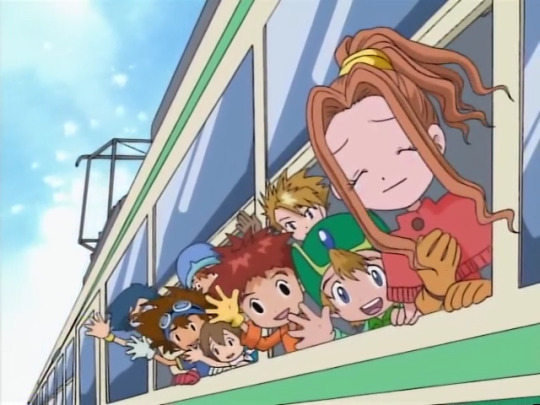
Yeah, so, this ending. You know this really famous ending? The one that’s had such an impact on franchise history that a lot of later things have even tried to imitate it in some form? The one that everyone cites as one of Adventure’s most famous scenes (for good reason)? This ending only exists because of 02. You know what actually would have been Adventure’s ending if 02 hadn’t existed?
The 02 epilogue.
The ending that we now know as the “02 epilogue” was actually decided on before recording for Adventure had even started. (They weren’t even sure about finalizing the character personalities yet!) All of the most substantial details about that epilogue -- the series actually being the adult Takeru’s novel, everyone in the world having a Digimon partner, and, as it seems, even Yamato and Sora getting married -- were decided on before 02 was even in the picture. Most likely, the only material difference would have been that the four characters introduced in 02 (Daisuke, Miyako, Iori, and Ken) and their partners wouldn’t have been involved, but everything else would have roughly been the same as the “epilogue” we know now. (This especially makes sense when you consider that one of Adventure’s major influences was the movie Stand By Me, which is extremely culturally influential in Japan as a “childhood summer adventure story”, and involves a similar timeskip epilogue with one character growing up to chronicle the story as a writer.) All of this was basically intended to tie into Adventure as a narrative of “a story of humanity’s evolution”, so this ending was envisioned as the “natural conclusion” of the story of Adventure as a whole. If anything from the original Adventure ending would have been retained in this hypothetical scenario of only Adventure existing, perhaps the sentiment of “parting” at the end -- but then it would still be followed by a timeskip epilogue 28 years later and everyone in the world having a partner.
But then it was decided that a second series would be made, and at some point they decided it would be a series set three years after the first, resulting in: this.
What this means is that Adventure’s ending was only ever intended as an ending for a single chapter in the overall Adventure series narrative. A lot of people like to pose 02′s existence or epilogue as something that “undid” Adventure’s ending, as if it was supposed to be some “ambiguous bittersweet” ending about whether they ever met their partners again, but...that ignores the real-life context of Adventure and 02′s production, where Our War Game! (which depicted an easy reunion with their partners, went out of its way to cameo Miyako in advance, and, for all intents and purposes, practically spoiled Adventure’s ending by depicting them as separated at all) screened before Adventure’s last episode aired, and there’s also the Adventure mini dramas that depicted more incidental meetings (and despite the constant fourth wall breaking and absurd crack content in them, yes, they’re intended to be taken as canon).
Again: in real life, the first episode of 02 aired one week after the last episode of Adventure. Even the real-life audience was likely well aware that this wasn’t going to be the end (and if they weren’t, they certainly would be when the promotional trailers for 02 started airing right after Adventure’s last -- and that’s assuming you missed all of the promotion appearing in real life beforehand, including at the end of Our War Game!’s screenings). The production staff all knew, because they’d already been working on 02 for months now -- they postponed their originally intended ending just to make this new one, after all!
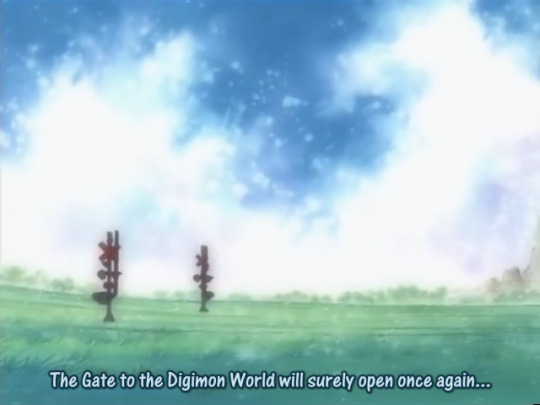
So yeah, this line isn’t supposed to be just a vague “oh, maybe they’ll meet again” in an abstract poetic sense -- it’s completely literal, because it’s hinting at said gate opening again one real-life week later.
From both a story perspective and a real-life audience perspective, this ending was never meant to be seen as ambiguous.
Takeru and Hikari’s character arcs
02 often gets an accusation of being lacking in the character development department (one that I seriously disagree with and have been working very hard to counter), but this accusation especially gets levied often at Takeru and Hikari, who are often said to be “flat” or “kind of just there” in 02 (which, again, I object to; more on this below). This is often rationalized as a theory that the writers didn’t know what to do with them because they’d already been in Adventure, but...this, again, assumes too much that Adventure was written in a self-contained vacuum and anything in 02 was just an addition done after the fact.
There’s actually quite a bit of evidence that the last cour (or at least a significant amount of it) was written with the idea that Takeru and Hikari were going to be starring in the next series in mind.
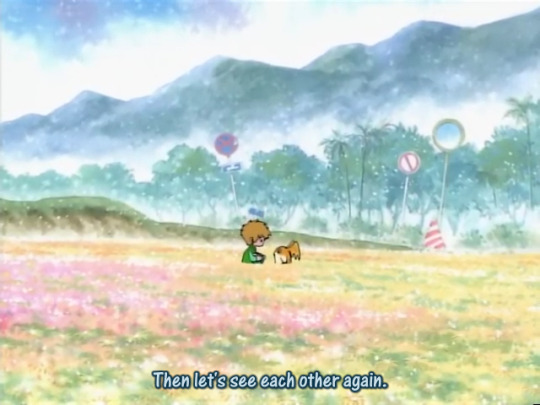
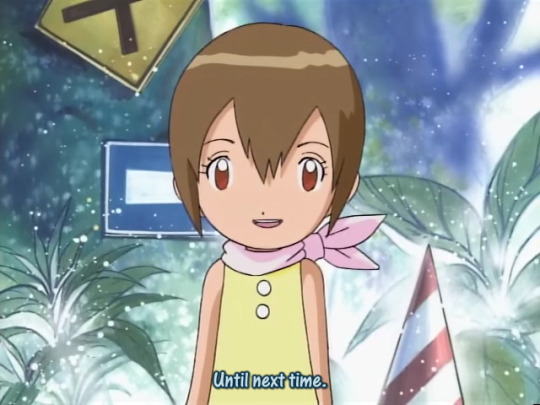
This is especially pretty apparent when you get to the last episode, where Takeru and Hikari are conspicuously the ones to leave off on the most confident “we’ll meet again” notes, compared to the other six. Of course, they do it in their own respective ways (Takeru and Patamon resolve to make it happen, while Hikari cryptically acts like it’s already bound to happen, borderline prophetically), and maybe you could chalk it up to the fact that they’re the youngest and therefore most naive of this group...but, again, remember: 02′s first episode aired one week after this one, where we would immediately be treated to Takeru and Hikari following up on this. Given that, you can basically see this as a wink and a nod: “yeah, these two have a story that’s not over yet.”
And as much as I may sound like a heathen to the fanbase by claiming this, I would actually say that it’s the opposite of the above claim: Takeru and Hikari both have pretty unresolved arcs by the end of Adventure compared to the rest of the other kids, and in fact are fleshed out more in 02. It’s honestly kind of a stretch to say that they “already got development” in Adventure -- Takeru still has a ton of unresolved issues with his family and trauma and emotional behavior that aren’t properly addressed to nearly the same degree as how the older kids have their core issues brought to the forefront, while Hikari really was only around for less than half the series, and not only is her main problem of emotional suppression told purely from Taichi’s mouth and not her own, we also get no real follow-up on how she intends to work past that.
Those are some pretty huge things to leave unresolved at the end of a series that’s known for its focus on individual character development, and considering that the premise of 02 involving an older Takeru and Hikari was likely finalized around the middle of the last arc of Adventure, it’s easy to believe that they decided to deliberately hold off on resolving Takeru and Hikari’s issues in full so that their story could be told in the next series. And, indeed, while their characters being built on “being difficult to read” makes their development not quite as visible as some of the more eccentric personalities in the 02 cast, their respective Jogress partners (Iori and Miyako) more openly discuss and get to the bottom of their issues that had been lightly displayed or hinted in Adventure but never truly been addressed.
A lot of things that were not in Adventure
Adventure was admittedly kind of written as they went along (they didn’t even originally plan to have Hikari as the eighth child at first), so it’s hard to tell exactly what was planned and what was a later addition (and at what point things were added), but considering that the 02 epilogue was one of the first things planned in the entire series, as part of “a story of humanity’s evolution” and tying into a really long theory about partners doubling every year, it’s probably at least safe to say that a lot of the worldbuilding and lore was determined very early.
02 added a lot of lore dumps about Digital World mechanics and things related to the overall state of Chosen Children, which have been said by many to be retrofits to justify a buildup to the 02 epilogue, but, again -- the 02 epilogue was supposed to be for Adventure, so it’s very likely that these lore aspects were intended for Adventure as well! This is especially because it’s been outright confirmed that there were at least certain things originally intended for Adventure that ended up in 02, or at least were in 02 because they felt Adventure didn’t sufficiently cover it:
The kids’ home lives. As famous as the Tokyo arc of Adventure is, it only covered about a quarter of it -- the rest of it was the kids stranded in another world, separated from home! It’s specifically 02 that went into all of the things like school life, family life, daily life in Odaiba, and everything closer to the real world -- basically, everything related to family backgrounds that was very likely to have been in the planning documents for Adventure but never made it.
The (in)famous 02 episode 13 (or, at least, something like it) was intended for Adventure. As much as there’s common speculation that this episode was intended to be some giant subplot that got canned, from what we’ve heard from the staff, the truth actually seems to be a lot more mundane -- Adventure was a series very big on “oddities about the Digital World that have no real explanation” (see: phone booths), and when you reframe it in Adventure’s context, it’s likely that Dagomon and the Dark Ocean were intended to be yet another of those as part of its wider lore about the multiverse, to make you think “the heck was that?” but never get any real answer to. (And while it’s unclear whether the original theoretical Adventure version of this episode would have still involved Takeru and Hikari, if you want to put a tinfoil hat on and entertain that theory, it lends even further credence to the idea that their respective character arcs were deliberately held off for 02...)
Given that, and thinking about the 02 epilogue as the eventual goal for the series, you can also easily imagine a lot of 02-introduced things leading up to it as probably also having been baked into Adventure’s lore:
You know how 02 had a subplot about Chosen Children proliferating all over the world, as a lead-up to everyone in the world eventually having a partner? This was part of a “doubling every year” formula that’s been referred to a few times in background staff testimony. If you inspect this formula, this means that there were eight other Chosen Children besides Taichi and his friends, chosen between 1995 and 1999. Now, remember how Adventure episode 52 briefly touched on the bombshell of Chosen Children existing before Taichi and co., before never addressing it again? Considering all of the above facts, it’s very likely that’s intended to tie into that formula -- and, perhaps, had 02 had not existed to continue the subplot about “more Chosen Children”, Adventure would have taken more initiative about explaining the concept of Taichi and his friends not being the only humans with partners, and led it into their originally intended epilogue.
02 episode 33 involves Miyako visiting Kyoto and learning that there may be certain similarities between Digimon and Japanese youkai, to the point where they might be related somehow, despite predating digital technology. (The concept is revisited in Mimi’s track in Two-and-a-Half Year Break and the Adventure BD drama CD, both of them having been written after 02.) The thing is, the idea that Digimon and other similar entities actually existed prior to digital technology, and that said technology only allowed it to manifest physically in the real world, also is heavily tied to the original concept of Digimon partners being a manifestation of a part of the human’s soul, and therefore having a partner being a part of human evolution -- which is, again, heavily tied to the original intent behind the epilogue. So it’s very likely that this, at the very least, was one of the original lore points behind Adventure -- and if 02 had not existed, it’s possible that Adventure might have tried to cover it as part of a lead-up to that epilogue, rather than ultimately deferring it to 02.
This is, of course, speculation -- I’m not a member of staff, so I can’t speak for them -- but I do think it’s important to consider that while 02 was a tonally different series, it wasn’t just a sequel tacked on at the last minute, and rather just (mostly) the same staff learning three-quarters of the way through that they would have more time to continue this narrative, and reorganizing things to figure out what they wanted to do now and what they wanted to touch on if they had more time. Really, this whole narrative of “02 being a bunch of random additions they came up with and retrofit” seems to almost be the opposite of what actually happened -- while some of the ideas behind 02 were certainly created later, it’s less that Adventure was some ideal perfectly crafted story and 02 an addendum, and more that they had so many things they wanted to do in Adventure that couldn’t fit and used 02 to vent more of those out:
One of the concepts behind the prior series was for us to pack in as many interesting things that we’d seen, heard about, or read about as we could into it, so for 02, we thought, what else could we put in beyond even that?, and so we looked over what we needed to have, and put in all the things we could so that they wouldn’t be left out, and the story became a multi-layered one, overlapping and accelerating. It was to the point that, after we’d gone through 02‘s story, the scriptwriters told me that they’d worn everything they had out to the ground. In any case, we put everything we had into it back then.
Which means that understanding 02 is actually very retroactively important to understanding Adventure -- Adventure’s own writing was influenced by the knowledge that 02 would be part of its story, and 02 itself carries a lot of vital facts and story points from Adventure’s narrative that didn’t fit in the first 54 episodes, and, in real life, they were both written continuously as one story over the course of over two years. It’s also because of this that I seriously warn against seeing either series in a vacuum too much -- because both series are very deeply tied to each other, perhaps more so than a lot of people want to admit.
142 notes
·
View notes
Note
On your comments about Jack: ye-es, in the sense that Jack is a character who definitely deserved better than he was treated by the characters. The way Dean especially treats him reflects very badly on Dean, no question. But, speaking as a viewer, I think the perspective needs to shift a little bit.
To me, Jack is Dawn from Buffy, or Scrappy Doo. He’s an (in my opinion) irritating kid who is introduced out of nowhere to be both super vulnerable and super OP, and the jeopardy is centered around him in a way that has nothing to do with his actual character or relationships. He’s mostly around to be cute and to solve or create problems — he never has any firm character arcs or goals of his own, nor any deeper purpose in the meta narrative. In this way, he’s a miss for SPN, which focuses heavily on conflicts as metaphors for real life.
Mary fits so much better in that framework, and introducing her as a developed, flawed person works really well with the narrative. It is easy for us to care about Mary, both as the dead perfect mother on the pedestal and as the flawed, human woman who could not live up to her sons’ expectations. That connection is built into the core of SPN, and was developed over years, even before she was a character. When she was added, she was given depth and nuance organically, and treated as a flawed, complex character rather than as a plot device or a contrivance. She was given a voice and independence, and became a powerful metaphor for developing new understandings of our parents in adulthood, as well as an interesting and well-rounded character. You care that she’s dead, not just because Sam and Dean are sad, but for the loss of her development and the potential she offered. So, in that sense, I think a lot of people were frustrated that she died essentially fridged for a second time, and especially in service of the arc of a weaker character.
And like, you’re right, no one can figure out if Jack is a toddler or a teenager. He’s both and he’s neither, because he’s never anything consistently and his character arc is always “whatever the plot needs it to be.” Every episode is different. Is he Dean’s sunny opportunity to be a parent and make up for his dad’s shitty parenting? Yes! Is he also Dean’s worst failure and a reminder that he has done many horrible things, including to “innocent” children? Yes! Is he Cas’s child? Yes! Is he Dean’s child? Yes! But also, no! Is he Sam’s child? Yes! Is he a lonely teenager who does terrible things? Yes! Is he a totally innocent little lamb who doesn’t get why what he is doing is wrong? Yes! Is he the most powerful being in the universe? Yes! Does he need everyone to take care of him? Yes! Is he just along for the ride? Yes! Is he responsible for his actions? Kinda??? Sometimes??? What is he???
Mary as a character is narratively cohesive and fleshed-out. Jack is a mishmash of confusing whatever’s that all add up to a frustrating plot device with no consistent traits to latch on to. Everything that fans like about him (cute outfits, gender play, well-developed parental bonds with the characters) is fanon. So, yes, the narrative prioritizes Mary. Many fans prioritize Mary, at least enough that Dean’s most heinous acts barely register. To the narrative (not to Cas, which is a totally different situation), Jack is only barely more of a character than Emma Winchester, who Sam killed without uproar seasons earlier. He’s been around longer, but he’s equally not really real.
I debated on responding to this because, to tell the truth, I think we fundamentally disagree on a number of subjects and, as they say, true insanity is arguing with anyone on the internet. However, you spent a lot of time on the above and I feel it's only fair to say my thoughts, even if I don't believe it will sway you any more than what you said changed my opinions.
I'm assuming this was in response to this post regarding how Jack's accidental killing of Mary was treated so severely by the brothers, particularly Dean, because it was Mary and, had it been a random character like the security guard in 13x06, it would have been treated far differently. However, then the argument becomes less about the reaction of the Winchester brothers to this incident and more the value of Jack or Mary to the audience.
I believe we need to first admit that both characters are inherently archetypes—Mary as the Madonna character initially then, later, as a metaphor for how imperfect and truly human our parents are compared to the idol we have as children, and Jack as the overpowered child who is a Jesus allegory by the end. Both have a function within the story to serve the Winchester brothers, through whose lens and with whose biases we are meant to view the show's events. We also need to admit that the writers didn't think more than a season ahead for either character, especially since it wasn't initially supposed to be Mary that came back at the end of season 11 but John, and they only wrote enough for Jack in season 13 to gauge whether or not the audience would want him to continue on or if he needed to be killed off by the end of the season. Now, I know we curate our own experiences online which leads to us being in our own fandom echo chambers, however it is important to note that the character was immediately successful enough with the general audience that, after his first episode or two, he was basically guaranteed a longer future on the show.
I have to admit, I’m not entirely sure why the perspective of how his character is processed by some audience members versus others has any bearing on the argument that he deserved to be treated better overall by the other characters especially when taking their own previous actions in mind. I’m not going to tell you that your opinion is wrong regarding your feelings for Jack. It’s your opinion and you’re entitled to it, it harms no one to have it and express it. My feelings on Jack are clearly very different from your own, but this is really just two different people who processed a fictional person in different ways. I personally believe he has a purpose in the Winchesters’ story, including Castiel’s, as he reflects certain aspects of all of them, gives them a way to explore their own histories through a different perspective, and changes the overall dynamic of Team Free Will from “soldiers in arms” to a family (Misha’s words). In the beginning he allows Sam to work through his past as the “freak” and powerful, dangerous boy wonder destined to bring hell on earth. With Dean, his presence lets Dean work through his issues with John and asks whether he will let history repeat itself or if he’ll work to break the cycle. Regarding Cas, in my opinion he helps the angel reach his “final form” of a father, member of a family, lover and protector of humanity, rebellious son, and the true show of free will.
From strictly the story, he has several arcs that work within themes explored in Supernatural, such as the argument of nature versus nurture, the question of what we’re willing to give up in order to protect something or someone else and how ends justify the means, and the struggle between feeling helpless and powerless versus the corruptive nature of having too much power and the dangerous lack of a moral compass. His goals are mentioned and on display throughout his stint on the show, ones that are truly relatable to some viewers: the strong desire to belong—the need for family and what you’ll do to find and keep it.
With Mary, we first need to establish whether the two versions of her were a writing flaw due to the constant change in who was dictating her story and her relationship to the boys, which goes against the idea that her characterization was cohesive and fleshed-out but, rather, put together when needed for convenience, or if they both exist because, as stated above, we are seeing the show primarily through the biased lens of the Winchester brothers and come to face facts about the true Mary as they do. Like I said in my previous post, I don’t dislike Mary and I don’t blame her for her death (either one). However, I do have a hard time seeing her as a more nuanced, fleshed-out character than Jack. True, a lot of her problems are more adult in nature considering she has to struggle with losing her sons’ formative years and meeting them as whole adults she knows almost nothing about, all because of a choice she made before they were born.
However, her personal struggles being more “mature” in nature (as they center primarily on parental battles) doesn’t necessarily mean her story has layers and Jack’s does not. They are entirely different but sometimes interconnected in a way that adds to both of their arcs, like Mary taking Jack on as an adoptive son which gives her the moments of parenting she lost with Sam and Dean, and Jack having Mary as a parental figure who understands and supports him gives him that sense of belonging he had just been struggling with to the point of running away while he is also given the chance to show “even monsters can do good”.
I’d also argue that Jack being many ages at once isn’t poor writing so much as a metaphor for how, even if you’re forced to grow up fast, that doesn’t mean you’re a fully equipped adult. I don’t want to speak for anyone else, but I believe Jack simultaneously taking a lot of responsibility and constantly trying to prove to others he’s useful while having childish moments is relatable to some who were forced to play an adult role at a young age. He proves a number of times that he doesn’t need everyone to take care of him, but he also has limited life experience and, as such, will make some mistakes while he’s also being a valuable member of the group. Jack constantly exists on a fine line in multiple respects. Some may see that as a writing flaw but it is who the character was conceived to be: the balance between nature or nurture, between good and evil, between savior and devil.
Now, I was also frustrated Mary was “fridged” for a second time. It really provided no other purpose than to give the brothers more man pain to further the plot along. However, this can exist while also acknowledging that the way it happened and the subsequent fallout for Jack was also unnecessary and a sign of blatant hypocrisy from Dean, primarily, and Sam.
And, yes, Jack can be different things at once because, I mean, can’t we all? If Mary can be both the perfect mother and the flawed, independent, distant parent, can’t Jack be the sweet kid who helps his father-figures process their own feelings on fatherhood while also being a lost young-adult forcing them to face their failures? Both characters contain multitudes because, I mean, we all do.
I can provide articles or posts on Jack’s characterization and popularity along with Mary’s if needed, but for now I think this is a long enough ramble on my thoughts and feelings. I’m happy to discuss more, my messenger is always open for (polite) discussion. Until then, I’m going to leave it at we maybe agree to disagree.
#long post#long ask#so long answer#guys it's 1 am#i hope this made sense#watch me read this after sleep and register things i wish i said#oh well#jack kline#mary winchester#spn#supernatural#spn critical#supernatural critical#kinda?#eh just in case#spn meta#supernatural meta#jack meta
27 notes
·
View notes
Text
The Goonies: The Characters
No matter how good a story is, how great the cinematography, or how subversive the genre-usage, a movie cannot stand without use of characters.
Characters are perhaps the most vital element of any story ever told. An interesting plot helps a movie greatly, but without a use of compelling characters, it falls flat on an audience who doesn’t care about the well-being of the people pushing the story forward. Viewers need flawed, interesting people, moving the story and trying to overcome conflict, in order for a movie to feel satisfying.
Or, they can have a bunch of bickering children stumbling and screaming their way through caves, led by Head Goonie: Michael “Mikey” Walsh.
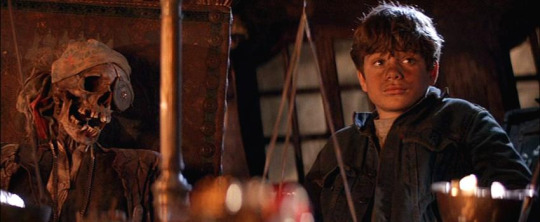
Only Sane Man Mikey is the glue of the group, bringing the Goonies together in an adventure, instead of just a bunch of kids hanging out in someone’s living room. He’s got the initiative, he’s the Determinator, and the Leader, and also, surprisingly, the Heart, in a rare combination. He’s the one jumping at the call, the Kid Hero armed with the Rousing Speeches in his desperate attempt to save the Goondocks. It would have been easy to make Mikey the most boring of the bunch, but he’s not, if anything, he’s the most interesting. He’s certainly the most inspiring.
Mikey is the driving force of the entire story. Despite the fact that he was reluctant to let his friends in the attic in the first place, once he’s there, he’s instantly pushing for his end goal. As much as Data is the inventor of the group, when you get right down to it, Mikey is probably the smartest of the bunch. It’s Mikey who figures out where they need to go, Mikey who leads the Goonies through the tunnels, Mikey who convinces them to persevere, to not ride up Troy’s bucket, to leave Willy’s private stash alone.
He’s dedicated to the point of almost insanity at times, judging from how Brand has to pull him back from going back after the treasure when the cave collapses. He’s also very interested in One-Eyed Willy himself, and acts like he knows him, or understands him, anyway.
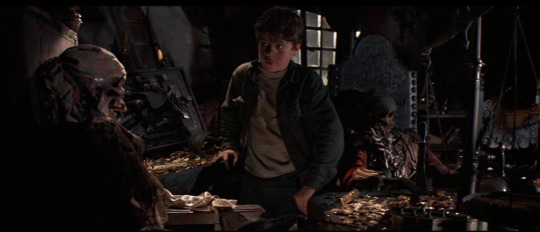
“One-Eyed Willy. Hello. I’m Mike Walsh, you’ve been expecting me. Haven’t you? Well, I made it. I beat you. I got here in once piece. So far. So, that’s why they call you One-Eyed Willy. One-Eyed Willy. We had a lot in common, huh, Willy? You know something Willy? You were the first Goonie.”
Apparently, Mikey sees a little bit of himself in this pirate, perhaps as a fellow leader or adventurer, or even a fellow outsider.
Like I said, Mikey could have been the blandest character in the bunch: just filling in as ‘the leader’ of the group, but instead, he’s as quirky as they come.
Despite the fact that this is an ensemble film, with every character sharing about the same amount of screentime, Mikey is clearly the protagonist, no questions asked. He is the character with the goal here, and as much as it benefits everyone else, it’s clearly his mission, his quest. The others are just along for the ride. Mikey is the character the audience is meant to identify with the most: he gets the most insightful dialogue and we as viewers identify more strongly with him as a character.
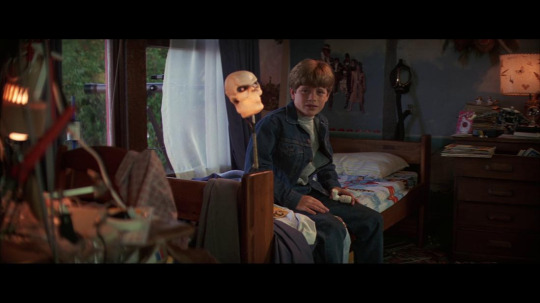
Although he’s one of the last characters introduced to the audience, it’s very clear right away who the story is about based simply on the Protagonist Problem: basically, do they have one? And while it’s clear that the other Goonies aren’t happy about moving away, none of them are taking it as hard as Mikey is. He is, immediately, the character with a Problem, and he’s also the only one to jump at a solution.
He’s the idealist. He’s cool under pressure (for the most part). He easily takes charge, despite his tamer personality in comparison with the others, even over the older kids, and he’s nice to boot. His goals are easily defined, he’s active, going after his goals and overcoming obstacles, he seems to be the perfect protagonist, if it wasn’t for one thing…
Mikey never really changes.
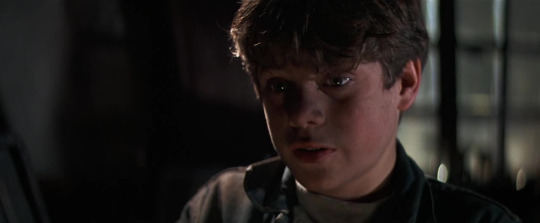
Sure, he throws away his inhaler by the end, which could be interpreted as symbolic of development, but honestly, Mikey is very much the same kid at the end of the film that he was at the beginning. Same personality, same worldview…even the same goals, which is another big protagonist no-no.
Most great protagonists have goals that change from beginning to end of the film, as a sign of their own developing character, but Mikey never does. Instead, he ends the film getting exactly what he initially set out to get: enough money to save the Goondocks. Sure, he has the relatively minor goal along the way of ‘staying alive’, but in the grand scheme of narrative stakes, to Mikey, clearly the treasure is all that matters.
The question is…is this a bad thing?
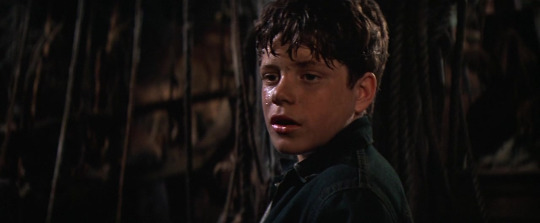
Well…no.
The thing is, Mikey is only one in a group of seven main characters, and while some of them have more screen time than others, when you come down to it, that’s a lot of characters to balance, meaning a lot of dialogue split up, and a lot of audience focus divided. In other words: Mikey doesn’t get development because he doesn’t have time. There’s just too much going on for the audience to stack character growth on top of it.
While there’s not nearly enough time from a script perspective, there’s also just no time from a linear perspective, either.
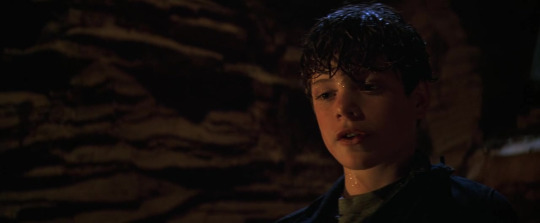
The story of The Goonies takes place around, give or take, a day, and while there are a few stories where development is done over that time, (Such as 12 Angry Men, actually) the fact is, twenty four hours is a really short period of time to change who you are as a person, or even change your goals. It’s very difficult to cram in the story, the characters, and everything else in such a short time span, and heap a deep, meaningful character arc on top of it. There’s just no time.
So, does that damage the film?
Not really. Like I said in the genre article, The Goonies is a roller-coaster adventure of a film, without much in breaks. There’s a lot going on all at the same time, and honestly, in order to keep the pace up, it’s for the betterment of the film that they didn’t try to cram Mikey’s character development within.
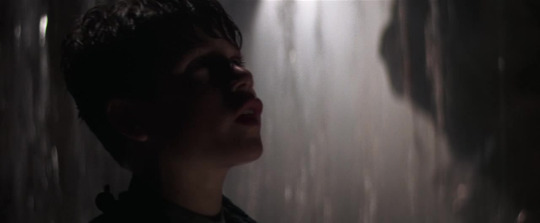
To be fair, it’s not as though he doesn’t change at all. But he changes about as much as the rest of the cast do, in very similar ways: kind of like his brother.
Brandon “Brand” Walsh fills out the other side of the sibling dynamic between himself and Mikey, the older brother who gets annoyed with him, but is also supposed to be taking care of him. As much as he starts out the film looking like he’s at least trying to be an Aloof Big Brother, when the chips are down, his Big Brother Instinct comes out, protecting Mikey from actual danger. Beginning the film as somewhat of a Butt-Monkey, ending up Hoisted by his Own Petard in the form of his exercise equipment, at first, Brand looks like he’s not really going to be terribly involved in Mikey’s Goonie adventure.
In the end, though, Brand turns out to be One of the Kids. But for careful viewers, that’s not really a surprise.
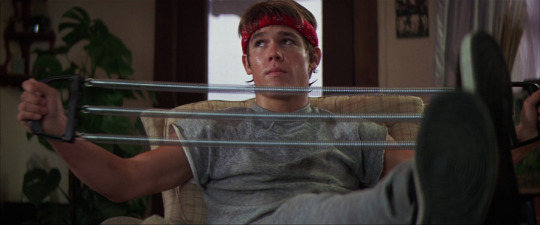
Even Brand’s first scene, where he interacts with Mikey, it’s pretty clear that although there’s a bickering dynamic between them, there’s also sympathy and affection. Brand knows that Mikey doesn’t want to leave, he understands and he tells him so. He hugs him and brings him inside when Mr. Perkins comes by with the papers to sign over the house. And sure, Brand bullies him a little and shoves him around and Mikey repays the favor by tying him to a chair with his own exercise equipment and running off, but that’s typical sibling stuff, as anyone with siblings can tell you.
Although Brand does initially try to ‘take charge’ and occasionally gives the marching orders, in the end, he leaves most of the leading to Mikey, which is a little strange. Once or twice he takes over, and is the most protective of the group, but while he may do most of the ‘planning’ here, he lets Mikey’s goals and priorities take center stage for a while.
Brand’s other chief ‘item of note’ concerning characterization is, of course, his relationship with Andy.
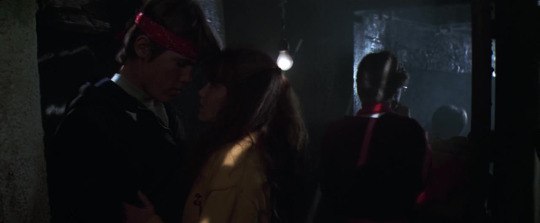
It’s mentioned fairly early on into the film that Brand is supposed to go out with her, and we see her once or twice, but it isn’t until she and Stef show up to check on Brand that we get to see any of that relationship. It’s sweet enough, aside from them constantly choosing the wrong time and place to attempt a first kiss, with Brand taking a side-role of protector for Andy specifically, again, showcasing that defensive side that comes in handy for the rest of the group from time to time.
But there’s more to the Goonies than the Walsh kids.
Probably the most recognizable of the characters from The Goonies is Lawrence “Chunk” Cohen.
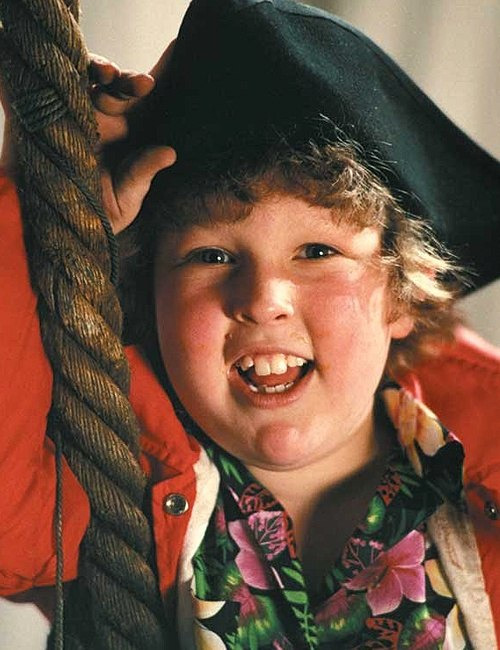
Chunk has most of the most memorable lines and scenes in the film, elevating himself in pop culture beyond simply the ‘Fat Comic Relief’ and klutzy, cowardly character that the movie seems to be pigeonholing him into at first. See, even though Mikey’s the one with the goal and character arc concerning the treasure, Chunk’s character arc revolves around the Fratellis.
Of all the Goonies, Chunk is the first one to get involved in the story. He is the first character we see indirectly interact with the villains of the story, when he spots the car chase, and by the end of the film, he is the character that has interacted with them the most, being drug around, interrogated, and locked up by them as a result of being left behind by the rest. Fittingly, his arc has very little to do with One Eyed Willy, and everything to do with the criminal family that he happens to fall into, to the point where they’re almost his arch-nemeses instead of the rest of the Goonies.
While an initial viewing could give viewers a very basic impression of Chunk as just the ‘token fat kid’ of the group, the fact is, he is one of the only characters who gets any real growth.
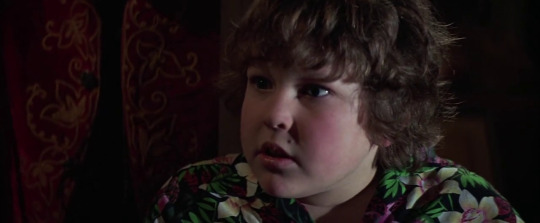
Chunk is established almost right away as the Boy Who Cried Wolf, a teller of tall-tales that have rendered him completely unbelievable to his friends and the local police force. By the time he has an actual story to tell, nobody around him is ready to buy it, and honestly, it’s hard to blame them. Some of his stories do sound ridiculous, and even the one that he’s telling now about the Fratellis would be hard to believe, if the audience didn’t know for certain that he was telling the truth. Of course, although he is able to feel vindicated when the Goonies discover he’s telling the truth, his tendencies to exaggerate backfire on him spectacularly when the police don’t believe he’s in trouble, and he’s left on his own.
Well, not quite on his own, but more on that in a minute.
Chunk primarily holds up the B-plot of the film on the villain’s side, arriving at the end to play hero and bail the rest of the Goonies out, proving to them, and then the rest of the authorities at the end, that this time, he was right, and proving his bravery after an entire film of attempting to chicken out. But as impressive as his last-minute heroism is, Chunk isn’t in this alone.
Despite being separated from the group fairly early on, sparing them from his complaints, hunger, and clumsiness, Chunk finds another ally in Sloth, the Fratellis’ brother, and befriends him, forming the ‘Brains’ to Sloth’s brawn, coming in to save the day and even adopting him at the end of the film.
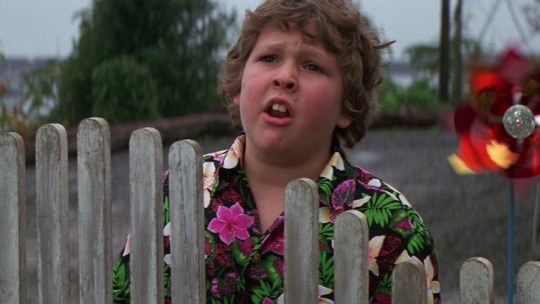
Chunk is the most memorable Goonie, not just for the Hawaiian shirt and plaid-pants combo that he’s rocking, but because he has a lot of very memorable and iconic scenes, possessing a pretty unforgettable (and loud!) personality and an arc: from zero to hero, when nobody, not even his fellow Goonies, expected it, complaining through the entire early adventure, and overall displaying an overwhelming desire to Not Be Here, making it all the more impressive when he goes after them with Sloth to rescue them.
But there’s more to the Goonies than just the leader and the breakout role.
Clark “Mouth” Devereaux is not the easiest kid to get along with. A Deadpan Snarker Jerk with a Heart of Gold, Mouth is the member of the cast with potentially the most Meaningful Name: he never shuts up. A classic case of ‘With Friends Like These…’, Mouth comes across like the most antagonistic character in the film other than the actual villains at times, abrasive and loud, bullying the rest of the group and picking fights with Stef.
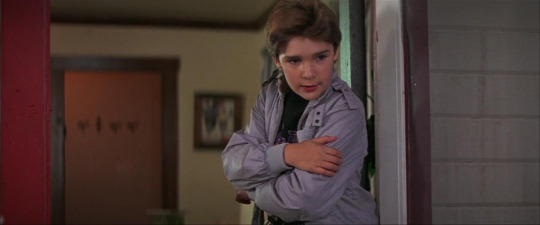
Unfortunately, Mouth’s…mouth, can get him into trouble. Quite often, in fact, like when he can’t let well enough alone and ends up getting threatened with having his tongue cut out.
With that said, though, Mouth does have his uses, and they’re not all to do with smuggling treasure in his most distinctive trait.
Fittingly, language is where he comes in handy: he’s the only one who can read (and speak) Spanish, leaving him as the obvious choice to translate the map, and also to translate the Walsh’s housekeeper’s exclamations that the treasure is not entirely lost. Without him, the treasure hunt is impossible.
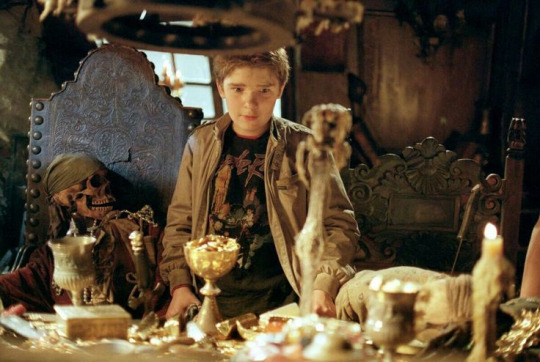
Mouth may want the treasure as badly as the rest of them do, but he is far less idealistic than Mikey is about it. He’s the last of the kids to believe Mikey in the beginning, and while it can be chalked up to his overall personality, there is a dash or two of Hidden Depths implied about him, notably in the wishing-well sequence:
“Yeah, but you know what? This one, this one right here. This was my dream, my wish. And it didn’t come true. So I’m taking it back. I’m taking them all back.”
Armed with a comb and occasionally appearing as though he’s deliberately striking a pose in order to look cool, Mouth is actually one of the first to start falling apart when their lives are in danger, crying and panicking with the best of them. (Again, he’s only thirteen.)
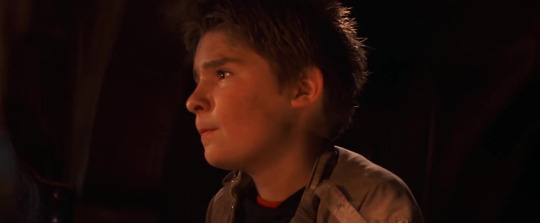
Despite having the loudest personality, Mouth is content to let Mikey lead the group, hanging back and picking on all of them, but by no means not one of them.
There is, of course, one more thing of note about Mouth as a character, and that is his dynamic with Stef. The pair carry a belligerent tension, bickering and snapping at each other throughout most of the film before demonstrating genuine affection towards each other (with a deleted scene referenced involving Stef promising to keep Mouth alive when they get pushed off the plank). It’s a hint at something going on between them for sure, but it’s also a fairly good example of Mouth’s relationships with everybody: he’s a lot more bark than bite, irritating and loud for sure, but a loyal friend who’s more than ready to help you look for treasure, even if he doesn’t 100% believe in it at first.
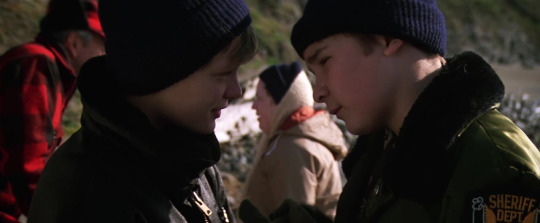
Like the rest, he doesn’t change a whole lot from beginning to end, with the adventure perhaps simply knocking some of his cockiness away and even leaving him a little nicer, but again, just like Mikey, it’s hard to say: this is all over the course of one, very exciting day. More on that later, though.
After all, Mouth’s hardly the last Goonie of the bunch.
Richard “Data” Wang is the inventor of all things Awesome but Impractical, falling somewhere between Bungled Inventor and Gadgeteer Genius. The Smart Guy, Data is good with his Homemade Inventions for sure, but there’s a bit more to him than that.
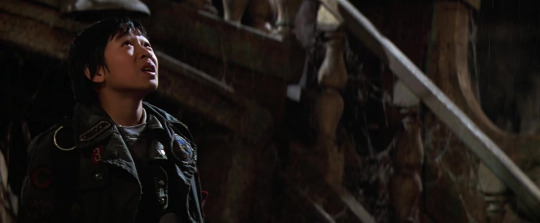
While the other Goonies (especially Chunk and Mouth) can best be remembered for being annoying or clumsy, or dropping things, or talking too much or too loudly, or setting off booby traps, Data is actually pretty even-keel. He’s excitable, and he really doesn’t want to move to Detroit, but overall, he’s fairly content to be the least talkative Goonie, letting his Dynamic Entries speak for themselves.
He’s a smart kid, and he actually is the only one who one-ups the Fratellis at any time, using his inventions to trip them up and hurt them, after the same inventions saved his life earlier. Data certainly does have a flair for the dramatic (best seen when telling Mikey that he won’t be taken alive) and is an energetic kid, proving himself as reckless as the rest, but he has a good head on his shoulders. He’s the one who discovers the counterfeit machine, and it’s fairly safe to say that without him and his Slick Shoes, the Goonies probably wouldn’t have made it out alive.
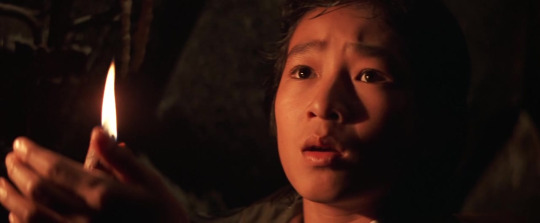
Like the others, Data doesn’t change much – in fact, he probably changes the least. This could be due to the fact that again, this is all over the course of roughly 24 hours, but it’s also possibly just a side-effect of being the most even-keeled of the bunch: he’s quieter, and therefore, we hear less from him, meaning we see less of his flaws. Still though, Data’s a solid character, hugely entertaining, likeable, and memorable.
Now for the other outliers:
Andrea “Andy” Carmichael begins the story as first The Cheerleader and Dude Magnet, and then The Load. Clearly not used to this style of Goonie Adventure, Andy kind of becomes a Hysterical Woman throughout a good portion of the journey, needing to be comforted a few times in order to keep her head. It’s hard to blame her: between the skeletons, the guns, and getting locked in a tunnel is pretty frightening, but Andy doesn’t do a whole lot (especially early on, during her Heroic BSoD) and manages to not retain much of a personality throughout most of the film, chiefly appearing at first to serve as a token female character and to be in love with Brand.
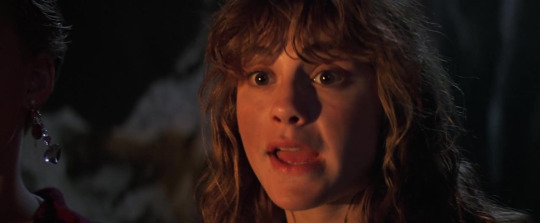
But there is more to her than that.
Even early on, Andy demonstrates a little more backbone when she elbows Troy in the lip and ditches him to go find Brand, and although she initially just follows the Goonies to hang out with Brand (and then to escape the Fratellis), she ends up becoming one of them when she makes the choice to stay instead of riding up the wishing well, sending up his letterman jacket instead. It’s a big step for her, a demonstration of her true alliances (a deleted scene was to include her being sworn in as an official Goonie at this point, actually), and sets her up for the rest of the film as being more ready and willing to actively participate in the adventure.
Near the end, Andy has to come through to save everyone, as she’s the only one who can play the piano even a little bit, and it falls on her to play the bone organ in order to get them away from the Fratellis and towards the treasure.
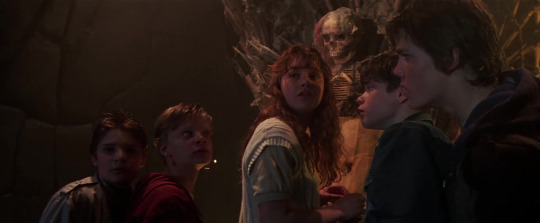
Andy actually has some more growth than a few of the others: she steadies out and truly does change, becoming a true Goonie by the end of the film, proving herself more capable than when she began. Although she doesn’t seem to have a stake in the treasure, she’s just as determined by the end to get it, and celebrates with the rest of them by the end.
In a way, she shares that with the other Goonie outlier: Stef.
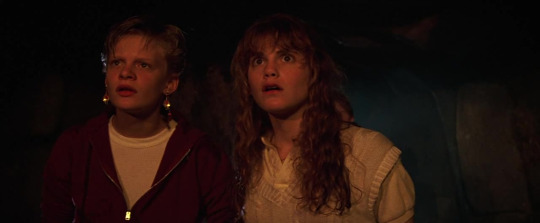
Stephanie “Stef” Steinbrenner doesn’t really seem to serve a whole lot of purpose within the story besides being another girl Goonie so there isn’t just one. She’s a friend of Andy’s, the Tomboy to her Girly Girl, who splits off to join her to find Brand and then ends up swept along with the rest of the adventure, and there doesn’t seem to be much more to her than that. She’s a Sarcastic Devotee, who feels Surrounded by Idiots: she trades snark with the best of them and tends to feel (rightfully so) that the people she’s around aren’t exactly geniuses. She’s loyal though, and sticks by Andy and the other Goonies until the end, proving just as determined to get to the treasure and get out alive as the others.
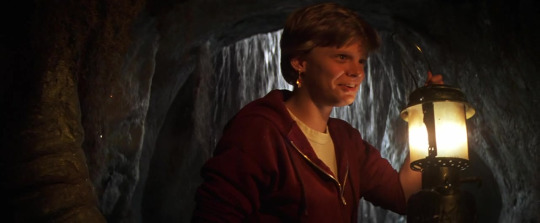
Stef serves as a reality check, another cynic who’s just as frightened as the rest of them, like Andy, without a stake in the final treasure, and while she’s never officially branded a Goonie, the implication by the end is clear. She sort of takes on a belligerent ‘big sister’ role throughout most of the film, and although she doesn’t have much of an arc, she is entertaining to watch, which honestly sums up the entire cast pretty well.
The characters of The Goonies do not exactly ‘grow’. There are small things: Andy’s growing courage, Chunk being finally right, Mikey’s growth as a leader, Data’s inventions being useful, Mouth taking some of his snarky edge off, and Brand being a better big brother, but honestly, these are very minor things in the grand scheme of the story.
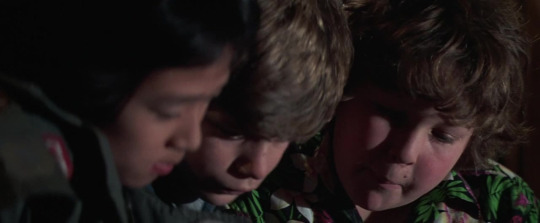
The characters in The Goonies are not deep, whether it’s the actual Goonies themselves or the villainous Fratellis, who are mostly characterized by striking a balance between being comedic and being a genuine threat. There are no huge life-lessons being learned by these people, and they aren’t really doing a lot of growing so much as they are running for their lives.
In a film that is essentially a ‘roller coaster’, The Goonies is not designed to have seven major characters with fulfilling character arcs: like I said before, there’s simply no time. It’d bog the story down for each character to have a moment of growth, to change significantly from beginning to end. In this case, the best thing about the characters is actually their consistency from beginning to end: there’s little change, and as a result, the audience never has to recalibrate to something else going on within the story.
In other films, this would be a huge problem.
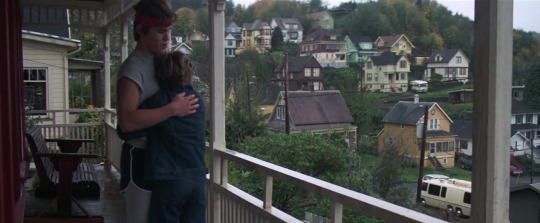
A feature-length film where there is no discernible character change is typically not a good call, but in this case, it works for multiple reasons. The story is too fast paced and focused on too much to allow for consistent breaks in plot that allow for character moments, and with the extremely short timespan, a big change would actually come across as forced and unrealistic. The characters are children forced into a tight spot, where their chief concern is their own lives. There simply isn’t the option open for development.
However, where the film lacks on ‘growth’ of characters, it makes up for in everything else.
The chief purpose of a character is to be there for the audience to like, to be invested in. There are actually plenty of films where characters don’t change a lot, classic movies that are well-liked because the characters, although unchanging, are hugely entertaining and interesting. Films like Back to the Future or Ferris Bueller’s Day Off don’t suffer from characters who don’t do any changing due to the fact that the main characters are fun to watch and have the audience’s attention and interest.
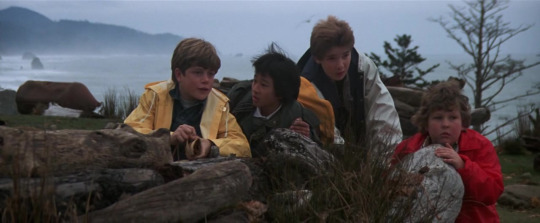
Which is just what The Goonies does.
Everyone can find a Goonie to relate to: the leaders, the loudmouths, the geniuses, the attention-seekers, everyone has a place here, and even adults who have hopefully grown out of some of the more immature kid-like behavior, there’s still the glimmer of familiarity in these kids. Like I mentioned before, we relate to these kids, and we want to see them win.
The Goonies as a story is designed to have simple, relatable characters for the audience to remember, and if that’s the goal, then it works perfectly. There are no deep characters with complex motivations here, and that’s a good thing: it fits the tone of the film consistently and coherently. Every character here is likeable in some way, memorable, for sure, and sticks with an audience enough that the audience wants to stick with them too, and wants them to succeed.
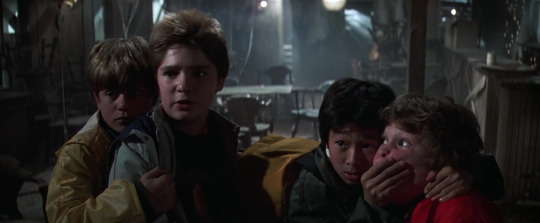
In the end, the characters of The Goonies make you care about them, make you root for them. They carry the story and do it all in a way that’s plenty of fun to watch, and when it comes down to it: that’s exactly what characters should do.
Whether you like or hate them, a character is there to make you care, and The Goonies certainly do their job. They leave a strong impact, and as a result, we remember these characters and their quirks long after the movie is over for a reason.
Join me next time where we’ll be looking at the 80s cultural impact on the creation of The Goonies. Thank you so much for reading, and I hope to see you in the next article.
#The Goonies#The Goonies 1985#80s#1985#Film#Movies#PG#Adventure#Comedy#Family#Sean Astin#Josh Brolin#Jeff Cohen#Corey Feldman#Kerri Green#Martha Plimpton#Ke Huy Quan#Richard Donner
15 notes
·
View notes
Text
My Review For Pokemon Sword and Shield (Spoiler-Free)
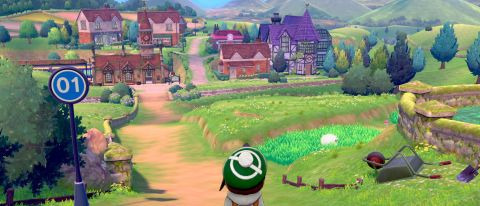
The road to Sword and Shield could be considered interesting to say the least. Shit hit the fan with everyone’s accusations, complaints, and grievances before the game even came out. Death threats, fake leaks, ridiculous critics, you name it. As a dedicated Pokemon fan, I saw huge potential with Sword and Shield, and I have officially completed Shield just a couple days ago. Reviews from official critics like IGN and Gamespot mainly praise the game giving it scores of 9.3 and 9 respectively. But then others off to the side of these major critics are saying the game “isn’t worth the $60″. I can say after playing the game myself to its completion (plus some) that the game is definitely in my view worth the money. I will break down my opinions of these entries by categories of Mechanics (how well the game works, how much gameplay there is, and how valuable the gameplay aspects are) Story (how good and effective the plot of the game is) Characters (how good the characters within the plot are) Dialogue (how good the writing of the game is) and Visuals (how good the game looks from a visual perspective). Here I go.
Mechanics: (9.1/10)

Sword and Shield is jam-packed with excellent features and gameplay elements to endlessly enjoy. The new Pokemon Camp feature is the best, most interactive way of playing and building your friendship with your Pokemon. The curry cooking is very simple, but it is more interactive then just giving a floating PokePuff or Bean to a Pokemon and having them chew it slowly right in front of you only to give it yet another one until they cannot eat anymore. You can throw a ball to have your Pokemon play fetch with you, speak to your Pokemon, and have them play with the little wand toy. While you cannot pet your Pokemon like in the past, the new features feels so fresh and even just watching your favorite Pokemon interact on their own is a worthy replacement for old systems like Amie and Refresh. Aside from Camping, the Gym Challenge was by far one of the best features. Gyms actually for the first time ever felt like full-fledged Gyms. Each Gym has their own special challenge in the beginning, and each one helped diversify the experience rather than tossing you into a room with randomly arranged trainers and the Gym Leader standing at the end waiting for you to get through the maze. I particularly loved Allister’s Gym Challenge, but every one of the challenges was a fun light-hearted experience. Many nuisances from the game that lingered in the past main titles have been removed, like no longer having to farm heart scales just to experiment with different move sets, having a Pokeball throwing shortcut, having a name rater posted in every Pokemon center, and many other quality of life improvements. The only problem I find with the mechanics of the game is the pop-ins. NPCs (ones that move from place to place), wild Pokemon, and berry trees all have their pop-in moments in the game. As you approach them, they come into view normally from a mid-range distance, and fade away again if you get too far away. This isn’t a huge deal when it comes to the experience as a whole, but it did slightly rob from the otherwise fresh Wild Area experience considering the pop-ins are the worst there. Lagging while online in the Wild Area is also a slight problem, but not too persistent of a problem.
Story: (8.5/10)

The story of Shield very much reminded me of the Pokemon anime in a sense (Swords being no different other than Pokemon variations). The narrative mainly focuses on the lovable and colorful cast of characters rather than a constantly changing dynamic plot. The plot is pretty big (not a Dynamax pun I swear), but it’s mainly told through your trainer character’s perspective, so the secrets of the unfolding plot occur through the perspectives of the adult figures, which you eventually see around the end. It’s not a complex story, but I found it to be very solid, kind of like a Pokemon movie. The characters carry the story along smoothly, and it’s a nice “save the world” Pokemon plot. There’s not a bunch of lore for the region, but what lore is explained is very suitable for the Galar region and I found it to be pretty interesting. I feel like the ending wraps up a little quicker than in usual Pokemon games, but the post-game story helps to finalize things even if it contains two very weird parodical characters. I think the point of the game’s plot is timely (for a reason I cannot elaborate upon for non-spoiler purposes, but to anyone who finishes it, you may know what I mean). I feel like it really connects with a real-world issue that the world is facing currently. Additionally, the story’s presentation was handled very well in most parts, I really liked the mid-battle cutscenes and the scripted battles that remind me of classic RPGs. While I don’t think the plot of Sword and Shield beats the darker dynamic plot of Sun and Moon, it’s good and solid all the same.
Characters: (10/10)

As I briefly mentioned in the story segment of this review, the characters are some of the biggest stars of this game. Each Gym leader stands out and have their own little backstory. These backstories aren’t told through cutscenes, but you can read their biographies on the back of their League cards which I thought was a good way of telling us more information about the Gym Leaders than we got with them in the past titles. Gym Leaders are normally just treated like pretty designs and then thrown away by the post game. Sword and Shield however puts each of them in the spotlight more and they all get some time to shine. The designs for the characters themselves I find to be particularly amazing. Personally, Piers, the long awaited Dark-type Gym Leader was my favorite, but every single one of them had something interesting in store. Aside from Gym Leaders, memorable characters like Marnie, Bede, Sonia and Leon really help liven and enrich the experience. I felt really invested in these characters, and when I feel that invested in the characters of a video game, I consider them a smashing success.
***ADDITIONAL NOTE***
I neglected to mention the most important characters to any Pokemon game: the Pokemon themselves! The designs of the Galar Pokemon and Galar forms are breathtaking. I love the vast majority of them and there’s very few that I think little of. The designs are themed and look very creative, I really loved the art direction for this generation’s Pokedex.
Dialogue: (9/10)

With the new Galar region, inspired off of the UK, the dialogue is bound to change. A lot of British slang is slipped in which was enjoyable even if I wasn’t familiar with some of it. Each character seemed to have their own way of speaking and I liked this individuality in dialogue. Nothing any of the main characters say seems off-putting, so I’d say the dialogue is in a very good place for a Pokemon game. It is a game that’s marketed for younger audiences, but it does a good job of not making you feel like a baby (something that prior titles also done a good job with), so the dialogue is consistently good for any audience. Some lines could be improved perhaps or less generic, but nothing stands out to me as an issue with dialogue, so I’d say the writing is pretty on-spot.
Visuals: (9.4/10)
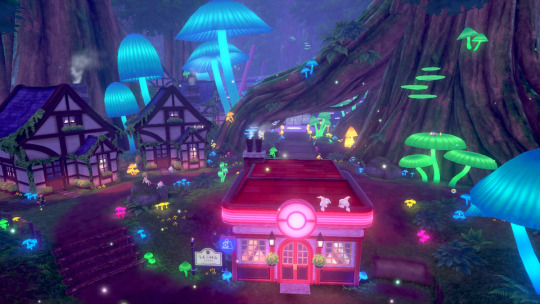
This is perhaps one of the most controversial parts of these games, with many complaining about reused models, trees looking badly textured, and the game looking like just an “upscaled 3DS game”. While I do agree that the Wild Area trees are terrible-looking upon close inspection, I by no means view this game as just an “upscaled 3DS game”. The visuals of Sword and Shield are by far the greatest the series has to offer, with town areas and dungeons looking absolutely superb. Some critics think that the graphics need a dynamic change, but I couldn’t disagree more. Graphics are a subjective thing until you’re delaing with something like the textures of the game (like the trees.) If fans don’t like the Pokemon style, they shouldn’t be playing the games anymore. Sword and Shield mastered the style the franchise should have with the very interesting, beautifully rendered areas like the Glimwood Tangle and Ballonlea. I found these areas and others to be breathtaking upon first seeing them and I just really adored the look of these games. As for the character models, (the people and the Pokemon) they look just fine. They’re not the biggest upgrade, but they fit in well with the rest of the game’s style, so no problems in that department. If you are to find graphical flaws that aren’t only subjective, they can be found in the Wild Area. The trees and some ground textures (near water in particular) are a bit blurred and wonky. But then you gaze upon the surroundings as a whole and it looks quite nice. The lighting looks incredible in many areas, and I just found myself in awe of just about anything I was looking at. As for the animations, there are some new incredible animations (like Cinderace’s Pyro Ball) and many well-polished animations. There are however some of the same-old animations that didn’t work and still don’t work like double kick and tail whip. Overall, the visuals are extremely nice and just what I’d expect from a next-gen Pokemon game.
My Verdict:

Pokemon Sword and Shield was an exciting new adventure that brought me back to the old days of playing Pokemon, only without all the nuisance problems that once plagued the fun of the experience. This game reminded me of what it was like to wholeheartedly enjoy a new adventure with new lovable partners. The graphics and mechanics are beyond refreshing, even if some areas could be better polished. The narrative isn’t as wide as Gen 7′s, but it’s as solid as I’d expect a Pokemon story to get while not straying too far from the roots of what makes them good to begin with. At the end of the day, experiencing Galar was without a doubt worth the $60 price tag, and the memories gained from the experience is even more priceless.
Final Score: 9.2/10 👍
#pokemon#pokemon sword and shield#pokemon sword#pokemon shield#pokemon sword and shield review#pokemon review#review#game review#dexit#pokemon sword review#pokemon shield review#nintendo switch#nintendo switch pokemon#pokemon switch#critique#controversy#pokemon sword and shield controversy#pokemon controversy#game freak lied#thank you game freak#gaming#Sword and Shield
21 notes
·
View notes
Text
y’all i saw terminator: dark fate!!!!!!!!!
GOD i loved it. i think i’ve admitted before that the only way i really rank exciting plot points in movies is by how much i anticipated them/wanted them to happen, and terminator: dark fate did NOT disappoint. fuck every writer or director who makes weird shit happen in their stories just to give the audience a story they couldn’t possibly have anticipated. (cough avengers endgame cough.) sometimes the best ending is one you can see from ten miles away, because that means it’s been set up EFFICIENTLY.
obviously, i think the new terminator did that. there were a few things i wanted to happen that didn’t (mostly regarding the life of one or two key characters), and a few things i legitimately didn’t see coming that i really liked, but ultimately the story was solid, awesome to watch, and very faithful to the original. i haven’t seen any of the sequels past judgement day, and i have no plans to change that anytime soon (lmao), but i’ve heard that it discounts all continuity past the second one, and that’s completely fine by me. the actors were great. LINDA HAMILTON was great. and i am sexually attracted to old soft arnold schwarzenneger. 😔
i was debating on whether or not i should make a separate post to talk about the time travel in the terminator franchise or if i should just go crazy go stupid and lump it in with my review and ultimately i think it can just go here, because i have some things to say re: the way it ties back to the originals.
personally i think the neatest example of time shenanigans in the franchise comes from the very first movie. that one sets up time travel in their universe as very “you already changed the past,” insofar as, without the time travel elements, there is the very real sense that the future the terminator came from would never have existed. kyle reese, from the future, becomes the father of his superior officer john connor. without the time travel, there would be no human resistance for skynet to fear. not only that, when the terminator’s arm is left behind intact, even after sarah destroys the machine, they set out the idea that skynet itself was DEVELOPED FROM THE TERMINATOR’S TECHNOLOGY, so if there was no time travel, there was no skynet, and no apocalypse... etc. at the end of the movie, the picture of sarah that kyle comes back with is taken by a child at a gas station, and it seems like a clue that everything is happening on track. sarah will give birth to john connor, the machines will rise up, the resistance will rally, time travel will ensue. the events of the first movie are a closed time loop, and ultimately, i find that really satisfying.
However.
from a narrative perspective, i think the changes in those time travel mechanics are super interesting.
basically, in judgement day, there’s still some implications that the timeline is a closed loop--the terminator’s hand is actually shown to be the basis of what will become the skynet computer, which is being built right then and there. the apocalypse could indeed be on, and everything seems fixed. then, though, they find the creator of the computer, and miles bennett helps them to destroy his work in horror at what he will create. skynet never happens. they change the future.
by dark fate, that ability to change what is “written” becomes not only a plot point, but a sort of rallying cry. the skynet apocalypse is officially off--now the dark future is controlled by a very similar breed of computer known as legion. sarah’s efforts changed the future, permanently. there’s the feeling perhaps that the future can only be changed to an extent (the skynet apocalypse being canceled, but replaced by a very similar robo-hell, for example--almost like the timeline is trying to set itself right), but that feeling is tested and challenged as the movie progresses. in that sense, dark fate is the full culmination of the trendline that their “trilogy” represents: sarah’s fate was sealed in dark fate, but with john’s influence in judgement day, things were officially set off course. dark fate represented dani’s turn, and she took everything into her own hands--she personally stood up and refused to run, refused to let the bad future win out, refused to take things lying down. sarah felt a kinship to her, based on the position that she found her in, but it’s like she realizes--dani is not sarah. sarah’s realization is that “she’s john,” which is closer--she’s the leader of the resistance, humanity’s only hope, but i think the message is pretty clearly telling us that she’s not john connor either--she’s dani ramos.
and she fucking OWNS.
one thing that i was a little iffy about at the start of the movie was the “white savior” thing. i don’t think that was an unfounded reservation to have--based on the formula from the first movie, a terminator is sent back to kill, and a hero is sent back to protect. this time, the “hero” is a white girl cyborg named grace, while the character in danger, who the movie clearly wants you to think is in the same boat as sarah connor, ie the mother mary role, literally important not for her own self but for her womb, is a mexican woman. that could have reached unfortunate implication levels like hella fast, but honestly (and i will disclaim this by adding that i’m white, so if you felt differently about it i would appreciate hearing why), i think the rest of the movie subverted that pretty beautifully. for one thing, grace being fundamentally human underneath her augmentation meant that she wasn’t an unstoppable machine ready to continue on until her metal frame was torn to shreds. she was a BADASS, obviously, and in the first fight, grace did prove herself a worthy successor to the “uncle bob” terminator in t2 with her kickass skillz (sorry kyle reese you’re just not that cool), but soon after that we got to see grace’s limits. if it hadn’t been for sarah connor, grace’s plan on the bridge finally boiled down to “when the terminator starts to kill me, run.” soon after that, grace’s power is shown to be fallible even more thoroughly when she hits her limit and starts to convulse, a byproduct of her augmentation. grace can do more than what a human can do, but she can’t do it forever like a machine could. very quickly in the movie, the tables were flipped, and even though grace came back through time to protect dani, dani was the one who had to take over the driver’s seat (despite never having driven before), and the one responsible for getting grace to medicine so that she could be resuscitated. and all that was BEFORE the big reveal.
a note: there were two scenes in pretty quick succession in this sequence that made me sob. the first of these was the death of dani’s brother diego, because in his last act, he was reassuring his sister that he was okay, despite being impaled by a metal pole. that line gave his character some depths that i hadn’t expected, and it really made dani’s pain after the car went up feel palpable. diego didn’t get a lot of screentime, but we saw him flirt lamely with a neighbor, we saw him dream of internet fame, we saw him joke at the factory even as his job was being replaced. we saw how much dani cared about him when she told him to take her job while she sorted out his replacement by machine parts. their relationship was a solid brick in the movie’s foundation, and his loss felt a lot more real than many comparable losses in movies. you know that whole “show, don’t tell” adage? they didn’t have to tell me that losing diego (and her father) was like a knife in dani. i saw that for myself. the second scene was at the pharmacy, when the employees and the other customers reached out to help grace even after she and dani had both lashed out and threatened them with the gun in fear of what was happening. y’all ever get emotional over the way that people are essentially good and will help each other when they can? god i fucking love that.
anyway, the reveal. the reveal was awesome.
i started suspecting that dani wasn’t the mother of humanity’s last hope, but rather, humanity’s last hope herself, during the conversation on the train telling us exactly the opposite. sarah makes some assumptions and projects her experience onto dani, telling her flat out that she’s pretty much a walking incubator for humanity’s last hope. there’s a sense that sarah might be bitter about having that role handed to her, and perhaps even more so because it was then taken away--she lost the son that she risked everything for, fought two terminators for, and for nothing: for some machines in a future that no longer existed. in that scene though, crucially, grace never says anything to confirm sarah’s assumptions. the one character with knowledge of the future doesn’t impart it, and it shows. sarah knows things that dani doesn’t simply because it’s not her first rodeo, but she’s also wrong sometimes, too. again in the kitchen later, the “carl” terminator asks about grace’s mission, but she doesn’t share it or give any information on who dani is going to turn out to be. the absence of information can often be an answer all in itself, and the reveal had some EXCELLENT groundwork throughout the movie--both in grace’s actions and in the brave and heroic actions of dani herself.
dani’s nature and grace’s past being revealed in the plane was one of the best scenes in perhaps the entire franchise. i said i sobbed at those scenes i outlines before, right? yeah, that was nothing to how hard i was crying and also cringey stimming during the reveal. we got to see a peek of dani ramos some twenty years in the future, and she’s incredible. she’s fearless, she’s tough, but crucially, she’s still kind. she takes no shit, but she not only saves a child’s life, but she offers a new one to the thugs who were chasing her. in just one scene, the way that dani bands a resistance together is obvious: she’s the best of us, and she uses that for good.
god, i love dani ramos.
the way that ultimately, dani takes the “hero” role over for herself (much like sarah did, honestly) and the way that we get to see grace’s weaknesses make them a very balanced pair. they’re both badass women in their own right (hell, sarah is, too), and they counter each other excellently. grace is augmented, and has physical capabilities that dani can’t match. at the same time, though, dani is willing to make risks that grace isn’t, because while grace’s concern rests on the fate of one woman, dani wants to find the best outcome for everyone--including herself, but not ending there. grace is willing to drop dani at the bottom of a mineshaft, if that’s what it takes to keep her safe. dani is willing to sacrifice her safety to face the confrontation that’s looming, because that’s what it takes to move forward.
i think one of the coolest things about the movie is that both grace and sarah come into the action with more experience in combat than dani, and more knowledge about the situation than dani, but ultimately the movie shows that they aren’t infallible, and there’s never a moment when dani is punished for naivety or made to feel stupid because she wasn’t as informed as them. both grace and sarah, in fact, are openly shown to be wrong about dani in different ways--grace knows who she’s going to become, intimately, but that closeness makes her too reluctant to put dani near the front lines, choosing to run indefinitely from the terminator rather than face it head on and use every advantage they can get to beat it. sarah, meanwhile, respects dani’s agency more, but in a way she sees past her at the start of the movie, dismissing her importance in a way that reads as sarah dismissing her own--she’s attacking herself and using dani as a proxy, but sarah’s wrong, because dani isn’t her. i love how both grace and sarah are good characters, and they’re both doing what they think is necessary and right, but they’re allowed to be wrong and misguided. ultimately, if it wasn’t for dani’s own agency and choices, the terminator would not have been defeated, and there would be no hope for subverting the bad future everyone is waiting for.
fate, believe it or not, is a very present theme in dark fate. obviously, i talked earlier about how this movie is the culmination of the “you can’t change the future” -> “you can change the future?” -> “you can change the future.” chain of events represented in the good terminator movies that i will acknowledge, but it’s more than just that. through the character of the “carl” terminator, we also get to see the blatant subversion of one’s nature for the better, and that was just. really epic. ngl.
in terminator 2, i enjoyed how john connor was protected by the reprogrammed terminator “uncle bob,” but i was a little disappointed by the execution. having uncle bob be a protector to john was exactly what i wanted, but the explanation that he had been programmed to do so rubbed me a little the wrong way. what i didn’t realize until i watched dark fate was that this pinged as wrong because dark fate gave me what i wanted: a terminator that didn’t change sides because he was taken down and forced to change, but rather, a terminator that actually made a conscious decision to be better because of what he observed in humanity. carl saw a familial dynamic and realized that he had taken that from sarah, and reached out to her, giving her a purpose like his family had given him a purpose, because he chose to. and that was the sexiest thing he could have done.
can you tell i LOVE what they did with the terminator. his arc and sarah’s were such awesome continuations for sarah’s general history and the progression of terminators played by arnold schwarzenneger. part of me was hoping for an ending where we saw sarah and carl drive off together, waving to dani and preparing to live out the rest of their years saving the future. yeah, well, we didn’t get that, but there were several scenes that hinted at forgiveness from sarah (an almost impossible feat given how she felt and what she lost) and trust between the two of them, and i loved that too.
dark fate was a good movie, y’all. it was so good.
there’s probably a million other things that i could talk about going down this vein, but this post is already a monster. i’ll just sign out by saying: one last thing i thought was epic and cool was how the protagonists cross the border from mexico into the us and at no point is such an action demonized; in fact, it’s necessary for them to reach essential aid in the form of carl, and the man who facilitates the action, dani’s uncle, is never treated amorally or like a criminal. i know, i know, the bar is on the fucking floor, but in the political climate we’ve got, for a blockbuster to take that stance felt like a pretty solid statement to me.
also, i liked the terminator’s line about texas. watching that in a theater in texas, i must report that it got the biggest audience reaction out of any line in the whole movie. folks, there were wolf whistles. ciao.
#terminator#terminator: dark fate#sarah connor#dani ramos#carl terminator#grace terminator#i feel like i like the movie more now than i did when i started typing this#don't get me wrong it's always been epic and sexy but while i was ruminating on it i realized things i didn't even know i felt#terminator dark fate is the gift that keeps on giving i must see it again
13 notes
·
View notes
Note
Any tips on creating a planet that is 100% ocean. Yes, there are lots of rocks and mountains but none break the surface. The planet has a moon too. I've got to think of atmosphere, storms, earthquakes, gravity, tides, flora and fauna, etc...
Saphira:
Step 1. Trim the Fat.
Think about your project. If its a novel, think about your plot line and characters. If its a game, think about your End Goal and mechanics. The places you want to work on first are where the experience meets the world. What characters are important (where would you want them to be?) Start there. If you start with "oh god how does the moon affect tides") then you're going to be halfway through a box of Oreos and a gallon of Kool-aid before the hour's done. Don't do it to yourself.
Step 2. Envision the Ideal
Chances are that when you chose this environment, you had an idea in mind. It might have been the mental image of a coral reef, or the love of Disney Mermaids, or how unfathomably insane sea creatures can be. Go back to that. What about it got your attention? What about it got your imagination going? "I want to live in that much colour." "I could have done a better job than Disney in representing Ariel's life." "I love the horror of Earthly Sea Aliens." Write it down. Pin it up. Put that in the center of your world building graphs. That's the heart. Tether everything to that.
Step 3. Research
Start from your Chart Heart. Take that Step 2 concept and start your research there. Research what Disney studied to make their world, or how coral reef biomes work, or the “Top Ten WTF is That Sea Animals”. Whatever it is. Then let the research web flow. You'll find something interesting. Read about that too. If you're getting something really exciting, see if you can find another reliable source for it. Write down your web of research around your Chart Heart. Jot down exciting details. Be careful. You can get utterly lost in this phase. Remember to come up for air, food, water and socialization.
Step 4. Connect the Dots
Your notes on your research will paint a picture. It will paint an idea. The notes, the chart you've made, will start to take on life and character. Put the research down and take a good look at your notes. If they're good inspiration points, they will start to tell you what your world is. You may start to see ecosystems. You may start to see mythology. You may see challenges for your characters to come across. Important: once you have started to get into the groove of your notes, bring back up your Project Plan from Step 1. Your narrative and your world need to work as one. As you go over the notes, go over your plot. Jot down or highlight points where the world and the plot REALLY GO TOGETHER. Celebrate those points!!
Step 5. Do it again
Yup! It's a cycle. Take your winning points of your world that really resonate with your plot. Make those the hearts of your new charts. Start research again. Make notes again. Connect the dots again. The point of world building is to provide a more living experience. Do not let the mechanics of your world building get in the way of your audience's experience. Also, have fun with it.
Tex: I'm gonna make a lot of assumptions here that you might think are superfluous, but they're important to narrowing down topics to what I think you're presuming.
When you say "100% ocean", you mean something along the lines of "surface covered with liquid water", yes? This is a surprisingly rare phenomenon in astronomy - Earth is the only planet that we know of to contain not only water on its surface, but liquid water that is stable and in significantly large quantities.
There are several celestial bodies that are very close to these parameters: Europa has a water-ice crust; Enceladus is covered by more solid ice than Europa; Ganymede is a mixture of water ice and silicate rock; Callisto has a surface composed of "water ice, carbon dioxide, silicates, and organic compounds". While their surfaces technically contain water, it's in a solid or mostly-solid form that's inaccessible for use to most life forms.
There are two main theories of how water comes to be on a celestial body, extraplanetary and internal. Extraplanetary sources rely on "Comets, trans-Neptunian objects, or water-rich meteoroids (protoplanets)" (Wikipedia), which impart only so much water due to factors such as the body's gravity and water-containing or water-inducing objects on a collision path with the body. It's not a particularly common method for producing water on a body's surface, unfortunately, and makes up a non-majority percent of surface water.
Internal water is both a more popular idea and a more common occurence. A liquid water ocean beneath the crust is possible, as in the cases of Dione, Pluto, Triton, and Ceres.
Frozen water, as in the case of ice, could be either purely water, or water and silicates (see: hydrate minerals ). It's possible that radioactive decay could have pushed subsurface water up, where it could have melted into liquid water and formed bodies of water such as oceans - this is especially possible if ammonia is present (Wikipedia). The heating of aluminum-26 could provide enough heat, also to force water to the surface (Phys.org), which brings up the important point that there needs to be enough heat for the water to remain a liquid.
For a body that contains water ice and is composed of primarily silicates, the contact of water with silicates will provide the hydrothermal and chemical energy to not only turn the ice into liquid water but also to maintain a temperature necessary to stabilize bodies of water as liquid. Radioactive decay as mentioned previously, tidal heating, and cryovolcanic activity all participate in the introduction and maintenance of surface water.
It is, admittedly, more difficult to find liquid water on the surface of an extrasolar planet, mostly because the "free" heat of the closest star is an easy way to defrost a celestial body. It's possible, but that would mean a greater reliance upon the internal heating and radioactive decay of the body itself, something that doesn't always pan out.
To elaborate on the idea of geological features of your planet, mountains are a function of tectonic activity and/or volcanic activity, and an indication of how active the core is of your planet. The higher the mountains, generally, the more active. Rocks are formed from pressure, magma, or a combination of both (Wikipedia), wherein mountains are usually metamorphic (Wikipedia). If you decide upon how your planet's surface water came to be, it'll feed into how your landmasses are created, as well as how high they'll generally be. I do recommend reading up on geomorphology, too.
Further Reading
Extraterrestrial liquid water - Wikipedia
Ocean planet - Wikipedia
Origin of water on Earth - Wikipedia
Hydrology - Wikipedia
Water - Wikipedia
Nebular hypothesis - Wikipedia
Ocean Currents and Their Role in the Biosphere by A.Ganopolski (chapter preview)
Insights into global diatom distribution and diversity in the world’s ocean by Shruti Malviya et al. (PDF)
Grazers and Phytoplankton Growth in the Oceans: an Experimental and Evolutionary Perspective by Simona Ratti et al. (PDF)
Life (Cells) - Wikipedia
Biota by sea or ocean - Wikipedia
Marine Biota Exchange — The Biologic Pump - EARTH 103: Earth in the Future, Penn State University
Synth: Okay, yes, you do need to think about all of that eventually, but it doesn’t all have to be at once. Some things will follow logically after others.
Tides do affect ocean currents to an extent, but so far I haven’t found anything that gets into how they might affect the flow of deeper currents, instead of just the shallower areas. Tidal effects are most noticeable along shorelines, so if all of your “land” is very deep under the water, you might be able to get away with not dealing with this at all.
Being in the water is the closest we can come to a microgravity environment without leaving the ground, so, again, you can probably get away with filing gravity under "I'll deal with this later". (Did you know that gravity isn't uniform across the planet? You'd think it would be the same all over, but no. There are high spikes and weaker spots and all kinds of variations. It's wild.)
Undersea earthquakes and volcanoes could definitely cause problems for your marine inhabitants, although earthquake-spawned tsunamis tend to ruin the day for land-dwelling organisms way more than they do for ocean-based critters.
Yeah, you will need to figure out atmosphere, but at this point just having one is the important bit. Prevailing wind direction plays a large part in the flow of surface currents, but the composition of said atmosphere can take a back seat for the time being.
Get your planet and decide which direction it rotates. Looking at maps of prevailing winds and ocean surface currents shows how the Coriolis effect from the planet’s rotation comes into play, affecting the direction of both the air and water currents: they travel predominately clockwise in one hemisphere, and counterclockwise in the other.
Then it’s on to topography.
Tex had a bunch of suggestions to look into for planning your world's geologic formations. Lay out your geography, your valleys and mountains, shallows and trenches just as if it was above sea level. The “normal” rules for placing settlements on land (waterfront real estate is The Shit), kind of goes out the window for a completely submarine world, but it isn’t time to think about building cities yet anyway.
So you’ve got your landscape. Now submerge it. Decide just how far under the surface your highest points will be.
The nice thing about water and air is that they're both fluids, and they behave similarly when they encounter obstacles like, say, massive mountain ridges. If air wasn't transparent we would be able to see how it eddies and flows around objects the same way water does. Well, to an extent we can sometimes see it, when it picks up bits of detritus and blows it around. Wind tunnels pump in streams of smoke to make the airflow visible.
https://www.ventusky.com/ and https://www.windy.com/ are great for visualizing air currents. Not quite so good for water currents, but the "Waves" tab does provide a little bit of info to build off of. It's fascinating to see how wind at 10 metres above ground mostly follows the lay of the land, while wind at 1000 metres easily flows into low-lying areas, but does a hard stop at the Rockies and the Andes (and a few other places), and winds at 30000 just don't care about paltry geographic barriers like mountain ranges. The ocean currents on your planet will, to an extent, behave similarly in how they interact with the landscape, e.g. being deflected by very tall mountain ridges.
Airflow is the predominant driving force for the surface currents, but what about everything below that? Terminology to research deeper here are thermohaline circulation and hydrothermal circulation. Hydrothermal circulation is most apparent around the ocean floor near volcanic activity and deep-ocean hydrothermal vents (“black smokers”) and occurs due to temperature differences. Thermohaline drives pretty much everything else, and occurs due to changes in temperature (thermo) and salinity (haline). The motion of these major currents is vital to the submarine ecosystem, since it’s the main way nutrients and heat energy are transported (fun – and maybe slightly gross – fact: the abyssal depths of the ocean are subject to a constant “snow” of dead things and assorted other organic detritus sinking down from the higher levels. It’s an important food source down there).
Knowing how the oceans move on your planet will help with placing settlements, if your planet’s inhabitants have gotten to that point. On land cities often start near water sources, but obviously. when you already are underwater, that will change. Food sources and shelter (from predators, from too-strong currents) are still points that need to be considered. Who settles in the shallows, where the water is warm and sunlight allows for photosynthesis? What about deeper down, where several currents meet to create a good place for eating? Maybe it’s all chemosynthesis near deep-ocean fumaroles instead?
For flora and fauna, ooh lordy you have, like, so many options. So. Many. For inspiration just look at all the wild and wacky and downright creepy stuff that lives right here on our planet, especially the deeper regions. Some of it you’d swear was 100% alien in origin, but nope, born and bred right here on good ol’ Earth, where it seems like the deeper you go, the weirder the living things become.
https://en.wikipedia.org/wiki/Physical_oceanography has more ocean phenomena and terminology (scroll all the way to the bottom to find it organized by category), to get familiar with and research.
188 notes
·
View notes
Text
The best TV of the decade? It’s a lot to sort out.
Impossible, really — and, at first pass, my picks for best shows of the 2010s wouldn’t look much different from most other critics’ lists: “Breaking Bad,” “The Americans,” “Game of Thrones,” “Twin Peaks: The Return,” “Veep,” “The Good Wife,” “Transparent,” “Atlanta,” “Fargo,” “The Crown” — that’s 10, right? Hit “send” and let’s get on with life.
But perhaps there’s another way to approach this stretch of much-too-much TV, and instead categorize the shared qualities that separated the decade’s very best shows from the heap of mediocre ones. That way, we can talk about this extraordinary period of scripted dramas and comedies without starting one last argument about where they rank.
I know readers only have time anymore to read lists, but bear with me. Here are the best kinds of shows we watched over the last 10 years. Many of them belong to more than one category — a sign of their greatness.
Anxiety-makers
These would be your nail-biters, seen mainly on prestige cable, often on Sunday nights.
Why we gorge on these cliffhanging, often upsetting dramas on the night we most need to rest up for the week ahead, I’ll never know, but we went to bed desperate over characters and story lines we couldn’t control: In AMC’s “Breaking Bad,” probably the decade’s finest work of story engineering and execution (and yes, I’m aware it premiered in 2008), when will Hank Schrader (or Skyler White) finally catch on that Walter White is the meth kingpin of New Mexico? Some of those close calls (the train episode!) and slow-building conflicts were almost too hard to take.
The decade’s other great adrenaline-producer, FX’s “The Americans,” aired on Wednesday nights, where the panic attacks seemed more manageable. How long would it take FBI agent Stan Beeman to figure out that his friendly neighbors, Philip and Elizabeth Jennings, were deeply embedded KGB spies? How much does Paige know? Will they outlast the Cold War? Showtime’s “Homeland,” meanwhile, neatly bundled our post-9/11 anxieties with the mental problems of a CIA agent who thought she could save the world.
These are but three shows that gave America’s TV addicts a strong case of the jitters. Others tried and sometimes came close. I started out the decade worrying way too much about Rick and the other doomed survivors of AMC’s “The Walking Dead” (until I gave up on them entirely a few years ago), but the show’s success is notable for its stress-inducement, which was so strong that the network started an aftershow, “Talking Dead,” to help audiences cope with the latest gory developments.
Immersive portraits
These were some of my favorite shows, broadly defined by the word “dramedy” (because they were sometimes intensely funny), but better described as character studies, portraiture — of characters I’ll never forget: Amy Jellicoe in HBO’s “Enlightened,” followed by Hannah Horvath in “Girls.”
Many shows in this category can in some ways be regarded as selfies. Louis C.K., who quickly became persona-non-grata, nevertheless triumphed with “Louie,” which made it possible for similar shows to act as a mirror that not only reveals a personal nature, but a universal quality that potentially can be shared by the audience. I’m thinking here of Donald Glover’s “Atlanta” (FX), Aziz Ansari’s “Master of None” (Netflix), Phoebe Waller-Bridge’s “Fleabag” (along with “Catastrophe”) and Pamela Adlon’s “Better Things” (FX).
This genre also, at long last, helped television achieve the diversity it had for too long failed to produce. Issa Rae’s “Insecure” (HBO) is a triumph in the way it both inhabits its creator’s viewpoint as millennial black woman, yet welcomes viewers of any sort.
To that list add Hulu’s “Ramy” and “Pen15,” HBO’s “Looking” and Comedy Central’s “Broad City” — any show where a viewer potentially discovers someone unlike themselves: different age, different background, different race. Or, more importantly, a viewer at long last sees themselves in the main character.
Washington certainly saw its uglier self in Armando Iannucci’s gloriously foul-mouthed “Veep” (HBO), the true definition of comic relief and on-point satire at a time when politics grew unfathomably absurd.
Metaphorical profundity
The best dramas in the 2010s reflected a larger message about the society that watched them — sometimes obliquely, sometimes bluntly. Despite its notably weakened final season, HBO’s “Game of Thrones” has proper claim, I think, to be deemed the show of the decade, but not just because it grew so popular. It’s because how much of it seemed to eerily echo our surroundings: Climate change (and denial of it); shocking acts of violence; widespread social collapse; galling politics; extreme disparities in class and wealth; weapons of mass destruction . . . I could go on.
Timing is everything. Hulu took a 1985 dystopian novel — Margaret Atwood’s “The Handmaid’s Tale” — revved it up and released it just as the Trump administration began detaining, locking up and banning immigrants, appointed conservative judges and looked the other way at nationalist fervor. The metaphor there was almost too applicable; fortunately, the show was strong enough to withstand the hype.
Viewers learned how to find meaning in just about any show — the betters ones made it more compelling: AMC’s “Mad Men” was a beguiling search for the soul of the 20th century; CBS’s “The Good Wife” was a wicked running commentary on politics, technology and modern relationships; NBC’s “This Is Us” was (and still is) a fascinating rumination on the essence of what makes a family. (Note to all you Ancestry genealogy nuts: It’s not just DNA.)
Happy-snarky-sweet
Certain comedies just make us feel better (and also sharper, wittier — empowered, even) no matter how many times we re-watch old episodes. It’s in the camaraderie aspect, the life lessons, the archetypal arrangements, the snarkiness glossed over by group cohesion. It’s a continuation of what began in the best multicamera, studio-audience, ersatz-family sitcoms (“Cheers,” “Seinfeld”), rejiggered for a wired generation. Most of them aired on NBC: “Parks and Recreation,” “30 Rock,” “Community,” “The Office,” “The Good Place,” “Superstore” — now joined by “Brooklyn Nine-Nine.” A few others aired on other networks, giving viewers a similar satisfaction: “The Big Bang Theory” on CBS; “Modern Family,”“Happy Endings,” “Cougar Town” and “Black-ish” on ABC.
Transformative tellings
In addition to finding new narrative styles and (quite belatedly) focusing on overlooked demographics, TV turned out to be an excellent venue for recasting an old story from a fresh perspective or enlightened distance.
I’m thinking here of FX’s “American Crime Story: The People v. O.J. Simpson,” a compelling departure from the way we popularly regarded that murder trial. It inspired others to dramatize previous events with a corrective, even courageous new viewpoint — such as Netflix’s “When They See Us,” about the unjustly imprisoned teens who were wrongly coerced into confessing to a 1989 Central Park attack on a female jogger.
Crime wasn’t the only subject in need of a remix. Both “Downton Abbey” (PBS) and “The Crown” (Netflix) succeeded because of the way they re-examine extreme privilege, without preventing us from enjoying the luxurious roll in it.
Some shows were revelatory in more subtle ways: Jill Soloway’s “Transparent” (Amazon Prime) masterfully wove a woman’s journey with the entirety of modern American Judaism, enlightening its audience to more than just the trans experience. And Showtime’s “The Affair” played with the very nature of truth, telling the story of marital infidelity from competing — and crucially different — perspectives.
Impossible puzzles and true art
If the decade in TV will be remembered for anything, it will likely be the complexity of some shows. The weirdness. The unexpected swerves. It turned its viewers into perpetual puzzle-solvers and conspiracy theorists. After beginning the decade with an unsatisfying wrap-up of ABC’s “Lost,” co-creator Damon Lindelof returned on HBO with a confounding take on “The Leftovers,” finally mastering the balance between befuddlement and momentum with “Watchmen.”
There are, finally, two standouts — and they challenged my ceaseless harangue about reboots. One was Noah Hawley’s expanded and wholly reimagined take for FX on “Fargo,” a Midwestern crime saga first seen in Joel and Ethan Coen’s 1996 film classic.
The other was David Lynch’s long-delayed but staggeringly beautiful sequel to his 1990 TV sensation “Twin Peaks.” Critics argued, somewhat pointlessly, whether “Twin Peaks: The Return” (Showtime) was a very long film or a strangely protracted TV series.
I can settle that: It was nothing short of pure art — unexpected, absolutely original and layered with deep, trippy meaning. Of all the TV I slogged through in the 2010s, it’s the show I most look forward to someday watching again.
Sahred From Source link Entertainment
from WordPress http://bit.ly/2td087u via IFTTT
2 notes
·
View notes
Text
My Official Unofficial Ranking of Supernatural Seasons That Nobody Asked For
This was...surprisingly easy. For someone who has a hard time picking favorites, I’m apparently quite eager to throw some seasons of one of my favorite shows under the bus.
My reasonings for this ranking are...all over the place. Since I’m considering seasons as a whole, I look mostly at the overall narrative structure, the prevalent themes, and the major character arcs. I won’t take individual/one-off episodes into much consideration...except for when I do. I won’t like some seasons/story arcs for any rationale between “this was sloppily executed,” “the message is misunderstood by viewers,” or even just that gif of Chris Evans “I don’t wike it.” I’m trying to look at seasons and storylines objectively, but I guarantee my Sam!girl bias will peek through at some point. Also, I reserve the right to change my mind at any point after I post this!
From bottom to top:
14 - Season 14
Ah, the twilight years of SPN. Now that we know this is the penultimate season, I’m a bit more lenient toward its shortcomings. Long running shows usually do stutter to a halt, story-wise. But still. I’m not taking it out of the bottom spot.
What was this season even about? Michael overtaking Dean? Nah, that barely lasted three whole episodes. Jack becoming evil? Not until the last six episodes. Team Free Will becoming a cohesive family unit? Lol. For a season that tried to set up Jack’s evil arc as a kid betraying his family, I hardly saw this “family” except in fanworks. The most heartfelt moments remained between Sam and Dean (not that I’m complaining about that—I loved those moments!) Was there an overarching theme besides “nobody is okay, especially Sam”? Season 14 is clumsy, unfocused, and does a poor job of telling the story it tried to tell. Even Mary’s second death reeked of “well, we didn’t know what to do with her and we needed a tragedy.” Oh yeah, and John was back for a hot minute.
13 - Season 9
Here’s one of these weird seasons. I like it, but I don’t. It’s well done, but it’s terrible. Also, I’m taking fan response into consideration on this one, since it colored my perception of it so negatively.
Season 9 could have been great. In a way, it was great. It was Dean’s dark arc—the part of Dean’s dark arc that I like. I’m not here to debate, just lay out the story. Dean stepped over a line. He tricked Sam into possession, lied to him for months, then refused to apologize afterward. He took the Mark of Cain as a penance, but it blew up in his face and turned him into something worse than he was before.
This is where fan response comes in. Fandom (from what I can tell; I wasn’t here back then) vilified Sam for setting boundaries with Dean, overwhelmingly siding with poor Dean who just didn’t want to be alone. The show, on paper, wasn’t trying to make the audience think this, but the POVs were skewed in such a way that we hardly got a chance to see Sam’s perspective and Sam’s trauma—so casual viewers didn’t really have a choice.
On a completely unrelated note (see, this is why this season is ranked so low) we have the angel storyline. What could’ve been a really cool and impactful story of celestial beings walking the earth, as well as Castiel exploring his new humanity in a way (that wasn’t just about sex) ended up a trite, dull affair about underdeveloped politics and characters I don’t care about. Did Metatron (the supposed big bad) even care about the Winchesters? I can’t remember. Only the actor’s indulgently entertaining performance saves that character. Even Castiel’s human arc was so short and ignored I sometimes forget it happened. This was a season that was so all over the place—good bones, bad execution.
12 - Season 12
This season is just...forgettable. Yet another season that was so all over the place—but unlike season 9, the story arcs did not culminate in a cool twist that pushed the SPN story to new heights. We had the BMOL, Mary’s return, and the Lucifer/Kelly/Dagon/nephilim story, and...honestly I can barely remember anything about them. The twisting story threads got interlocked at some points, like Mary working with the BMOL, and Sam and Dean working with them to take down Lucifer, but the threads were all wrapped up independently. To me, this suggests a lack of true investment in the stories and season arcs. Ultimately, Mary’s return was utterly wasted, the BMOL might as well have never existed, and the Lucifer storyline is a bloody, bloated carcass being dragged along behind the show by a fraying rope (called Buckleming) complete with a bad smell.
The reason I rank this season above season 9 is that I don’t shudder when I hear people talking about season 12. I don’t generally get angry when I think about it (except the way they did Crowley dirty) and it did give us Jack, the greatest fanon projection the show has ever given us. (I’ll elaborate on that in a minute)
11 - Season 10
This is the season in which I don’t like Dean’s dark arc. By that I mean...it wasn’t much of a dark arc. Instead of exploring Dean’s inner darkness and the choices that led him to take the MoC, we get a meandering season of (pretty enjoyable) one-offs. We are repeatedly told Dean can’t fight off what he truly is—except we’re also being told that Dean can’t truly control what the MoC is doing to him, meaning the MoC isn’t what he truly is. It’s a mixed message, and it ends up being too many episodes in a row of Dean staring moodily at his arm while he drinks. Sorry, an ancient tribal tattoo does not a compelling big bad make.
Speaking of bad guys, though, season 10 gave us Rowena! And more Crowley material! And the Stynes—wait, no. We don’t talk about...whatever they were.
I do like Sam’s determination to save Dean, and I even like the underhanded methods he used to get the MoC off. Charlie’s death was a horrifying shock, but it actually fed the story very well. And I know I said I wasn’t going to talk about individual episodes, but Soul Survivor and Fan Fiction are both epic.
10 - Season 8
...this season. This season is such a mixed bag you could almost rank it as two separate seasons! ;) This was Jeremy Carver’s first season as showrunner—and while I like what he ended up doing, I hated the way he played with the brother dynamics throughout the season, especially the first half. Season 8 starts out disjointed, very unconnected from the previous season. The story thread of “Sam didn’t look for Dean” is overplayed and very tired. Also a bit of a reach, considering the season 5 finale. My point is, Sam and Dean both act like pod people for the first part of this season. Dean is mad at Sam for...doing exactly what Dean himself did a few years ago (fandom misses the nuance of Dean’s hypocrisy and jumps right in the blame-Sam boat with him) and Sam is suddenly...living with a strange woman we barely get to meet and okay with not hunting anymore?
This is another example of the skewed POVs hurting the show’s message. We don’t get to see Sam’s grief the same way we saw Dean’s struggle in purgatory, and since Sam’s Amelia arc makes very little sense anyway, we’re forced to imagine it—and this is a disservice to both Sam and the overarching story.
However, the saving grace of season 8 is the second half. We get the bunker, the Trials storyline, which is a whump goldmine for my Sam-loving heart, and one of the best season finales this show has ever produced. I mean...they got married. In a CHURCH! I’m not really a wincester, but seriously how do you not ship it just a little when the show gives you stuff like THAT?!
*deep breath* I’m good. Moving on!
9 - Season 13
I...have a soft spot for this season. Anybody who follows me on here can probably guess why. That’s right, it’s Jack, the greatest fanon projection the show has ever gifted us.
Let me explain. The narrative structure of the season is a mess. The exploratory theme of Sam and Dean as parents is derailed by the fact that Sam and Dean spend less than six episodes with their surrogate child and spend the rest of the season spinning their wheels until it’s time for the finale. Lucifer as a villain doesn’t give a crap about the protagonists, which makes him a really boring and terrible antagonist—to say nothing of the fact that two of the writers try to make him sympathetic and end up assassinating the character harder than Michael!Dean did. I only found Scoobynatural mildly entertaining. As for Asmodeus...who’s that?
Basically, the only shining light in this season besides the brothers is Jack. And we don’t even get a consistent characterization of him. He’s essentially a blank slate, which means we as fans and fanwork creators get to make him whatever we want. While he’s supposedly the Winchesters’ kid in canon, it’s rarely shown—that falls on us as fans to make a reality. And boy do we make it reality! This is where I found my corner of fandom, and that’s why this mess of a season ranks relatively high for me. Still in the bottom half, but it gave me one of the greatest gifts the show has ever given.
8 - Season 7
I shouldn’t have to defend myself, but while most of the fandom harbors a little black spot of hatred for this season...I don’t. Like, at all.
I don’t agree with all the creative choices of this season—the Leviathans were an out-of-nowhere big bad with no connection to the Winchesters. However, the guy who played Dick Roman did a fantastic job hamming it up. And I love how all the pieces came together in the end—Sam and Dean, Cas, Crowley, even Meg as a surprise reluctant hero. We also got Charlie! And Kevin! Bobby got a fantastic arc, both before he died and from beyond the grave. And Crowley, even though he helped win the day, also rigged the game so he took all the pieces left on the board. Mad respect for my king.
Also, as a stalwart fan of Sam whump, Sam’s hallucination storyline was all kinds of awesome. (Except for how it abruptly ended and was never spoken of again)
I know objectively this season isn’t very good, but I still find myself rewatching it a surprising amount. I have a soft spot for Sera’s storytelling, and she did not have complete control over the creative decisions for this year. Season 7 only barely misses out of the top half.
7 - Season 3
This season is great, it really is. I think the main reason I rank it so low is because of the shortened season—Sam’s aborted arc. And that was obviously out of everyone’s control; the creators had to just pick up the pieces and make do with what circumstances gave them.
Basically, I don’t have anything bad to say about this season. It’s a brother-lovefest, it gives us Bela and Ruby, and yes we get some truly great one-off eps. Bad Day at Black Rock, A Very Supernatural Christmas, Mystery Spot, Jus in Bello, and Ghostfacers are among my favorite episodes to rewatch. I just mainly miss the end of Sam’s arc. Although I do appreciate the writers’ strike giving us Castiel instead, I still wish we could’ve gotten to see boyking!Sam save his brother.
6 - Season 2
While on the surface season 2 is barely different than season 1, it also gives us loads of gamechangers. It’s the coming-of-age season—Sam and Dean aren’t kids anymore; in fact, they aren’t anyone’s kids. The season bookends of John’s death and Sam’s death make a horrible tragedy that I don’t even care much what’s in the middle.
But then again, everything in between is so good. There’s not much of an overarching story, just a sense of dread and desperation as...something...draws near. (We don’t even know what it is, but it still scares us! It’s masterful!) The tone is consistent and effective, the brother dynamics are still balanced enough to fully enjoy, and of course...there’s Playthings. :)
(Y’all are gonna stop believing me when I say I’m not a wincester, I can feel it. What can I say, I have incestuous shipping tendencies.)
5 - Season 11
This is a season that I could tear limb from limb for falling so flat in the end, but...somehow I can’t bring myself to. I didn't find myself into the Amara storyline too much, mainly because the God/Darkness sibling dynamic wasn’t developed enough to parallel with Sam and Dean invest in. But this season does an awesome job of healing the brother dynamics. While seasons 8, 9, and 10 were fight-heavy, Sam and Dean spend this season in relative peace. In times of potential crisis, they band together instead of fracturing apart. And that, honestly, is enough for me to forgive...well, a lot, plotwise. The Dean/Amara connection that went nowhere, the Casifer storyline that went nowhere, the Darkness’s grudge against her brother that...went nowhere...and I’m not even going to touch on the Sam/Lucifer dynamic that started out SO GOOD and then...well...
Again, I’m not going to touch on it. I love this season despite its flaws.
4 - Season 1
Here it is. The season that started it all. I said I was going to consider mostly narrative structures for this ranking, yet here season 1 is without much of a narrative structure, fourth from the top.
The first season of a show is always the feel-around-in-the-dark season. This is where we learn the rules of the show, how the world works, and most importantly, who our characters are. We spend 22 episodes with the writers and actors just...figuring out who Sam and Dean are, most especially who they are to each other. They were so successful in this that they spawned a fifteen year phenomenon centered around this fraternal love story. As an additional plus, since the characters were so new, season 1 gives us the most balanced POV between the brothers. We get to feel for both of them without being pitted against each other, and I appreciate that more than words.
The horror is old-school, the storytelling can be a bit cliche, but every show has an origin story and I’m in love with this one.
3 - Season 6
Again, I love Sera Gamble’s storytelling. It’s most evidenced here in her first year of showrunning. This season had the astronomical task of following up season 5. How do you follow up the literal apocalypse?
...Astoundingly well. To me at least.
This season’s narrative structure is my favorite. It’s kind of a noir thriller, with more twists and turns than Supernatural usually gets. In fact, having now watched Vampire Diaries and The Originals, season 6 of SPN kind of echoes those shows. (I don’t think it’s coincidence that TVD aired its first season one year prior to this)
Instead of trying to outdo the literal devil (the mistake of latter seasons) we spend most of season 6 not knowing who the big bad is. We meet a few baddies, get backstabbed by former friends, and we’re told Raphael is a threat, but in the end the big bad was the friend we made along the way—Castiel. It’s depressing, it’s not what we expected, and it’s honestly a departure from “traditional” SPN. But I like it. I like it a lot. If Sera had been allowed to do more seasons like this, she probably would’ve stayed longer.
2 - Season 4
I love a lot of things about this season. The way they handled the angels was great—the right way to do unknowably powerful beings. I like Sam’s dark arc. It’s coupled perfectly with his good intentions and his all-consuming love for his brother. The plot twist at the end is perfect—Sam, in doing the right thing, unleashes the worst evil this world has (yet) known.
The tone is also perfect. It’s dark. A little edgier. Edging toward eldritch horror rather than ghost horror. Balanced out with light episodes that pack a hard punch in the feels regardless. And this is a little thing, but the color grading shifts back to more sepia after the technicolor of season 3. It gives us this little sense of dread throughout the season without even knowing why.
I could complain about the skewed POVs, about how fandom still sometimes crows “Dean was right about Lilith!” when all Dean opposed was Ruby and the demon blood—he wanted killed Lilith too. But as this instance of POV-warp serves the storyline in a good, necessary way, and Sam truly did need to be brought back from his dark path, I’m choosing to ignore it.
1 - Season 5
Are we surprised? Maybe some Sam fans are—I know some who get vexed about the blame for the apocalypse being solely and constantly placed on Sam...but I’m not. The overall story of season 5 is just so good. Lucifer is a good villain in this season. Sam and Dean have an excellent healing arc. The angels are good villains, also ironic mouthpieces of the overarching themes—despite touting “fate” and “unavoidable,” they are champions of free will, since they do whatever they want in their father’s absence. Zachariah most notably. Castiel was utilized in a good way (whereas now he struggles to still have purpose in the show) Bobby and Crowley both were good in this season (and also sparked a rarepair that’s—hilariously—canon) and this season did not pull any punches when it came to death. Even the main protagonists were shot point-blank halfway through the season! (Don’t talk to me about the samulet, I can’t do it without bawling)
And Swan Song remains my favorite season finale and overall episode. Dean relinquishing control of his little brother, allowing him to make the ultimate sacrifice for the sake of the world. I still halfway wish the series ended with Sam and Dean both throwing themselves into the Cage, destroying themselves for the world, out of love for each other. (insert “poetic cinema” meme)
And there we have it! To my mutuals, I’d love to hear your thoughts or your rankings. And to @letsgobethegoodguys - Steph, since this was so hard for you, I did it myself so I could feel your pain. 😘
#supernatural#through the seasons#spn#rankings#kylerrambles#listen—i welcome discussion!#pls talk to me!#but if you come on my post just to argue with me—don’t bother
13 notes
·
View notes
Text
when the lamp stays unlit
a multi-part anon that’s been waiting awhile:
...I never really fully thought of shiro as physically disabled... he had a fully functional prosthetic arm with all the motor skills of a real arm plus superhuman strength and so forth AND because it didn’t really impair him. It would be one thing if he was physically disabled and the show thus normalized disability; but to me, Shiro‘s arm (and Ezor‘s fake leg and Zethrid‘s missing eye) were more like sci-fi ‘cool battle scars’ rather than things that really impacted their social or emotional life. [...] The missing arm made [Shiro] more incapacitated during s7 (I guess?) but it was an excuse for benching him, which is something I found ableist. And while he has a mental illness as well, I thought it only ever became an issue when it was convenient to the plot. Hope that made sense, it wasn’t my intention to be insensitive since many people see him as great disability rep.
This is nearly as difficult a subject as race, but it’s also an important discussion to have. We do need the conversation about LGBT+ representation in VLD, but it’s drowning out an equally important conversation about how disability is represented (and treated) in popular media.
As a caveat, I’m a work in progress when it comes to un-learning the ableism that permeates Western culture, even when directly harmed by its perpetuation. So I’m inviting anyone with the spoons and lived experience to join in. The more voices and perspectives, the better.
Behind the cut: clarifying a few terms, how the SFF genre conceptualizes disability, how humans conceptualize difference, narrative treatment of Shiro as disabled, and PTSD/mental health in popular media.
First, let’s define some terms so we’re on the same page. Assistive technology “increases or maintains the capabilities of people with disabilities.” Adaptive technology (a subset of assistive) is tech “specifically designed for persons with disabilities and would seldom be used by non-disabled persons.” Gadgets like sock cradles are assistive, since an abled person might use them; a prosthesis or screen reader would be adaptive. The majority of media representations of disability will use adaptive technologies to signal a disability, rather than assistive. (definition from wikipedia)
Now for a few lesser-known terms. There’s a philosophical concept concerning the breakage of things we’ve always taken for granted. Like flipping a light switch: the light goes on. We don’t pause to marvel over what made the lightbulb glow. Then one day, you flip the switch and the light doesn’t come on. Now suddenly you have to stop and notice something that previously you’d never given much attention.
This sudden awareness of wrongness --- the light not going on --- takes three forms. It can be conspicuous, where it’s visibly damaged, ie the lamp is smashed. It can be obtrusive: a part is missing, ie there’s no bulb in the socket. Or it can be obstinate, ie the bulb and lamp are fine, we just don’t have power.
The abled perspective --- when suddenly reminded of disability --- is to see the disability as conspicuous and obtrusive. That is, broken and incomplete. Which means, that’s the only story the abled perspective knows, so that’s the story it tells, over and over.
It’s a common assumption, especially in the SFF genre: adaptive technology removes a character from the category of disabled. Cybernetic modifications or prostheses become design elements; the character is considered --- and written --- as abled. In a sense, the character is like the lamp when there’s power: the author can ignore the label of ‘disability’ and carry on without giving more thought to the issue.
But if there’s removal (or breakage), for the author, it’s like flipping a switch and the light doesn’t go on. You can almost hear the author thinking: ‘oh, forgot this character can’t do anything.’ Until the story provides repairs or replacement, the previously adaptively-abled character is now un-abled.
Disability --- in the absence of adaptive technology --- is, at best, obstinate. The character is neither broken nor incomplete; they’re a lamp without a power source. Nothing else has changed. But if someone never gave thought to how lamps need power to operate, their first reaction won’t be to ask if the power’s out. It’ll be to check the lamp, the bulb, the wiring, and declare it mysteriously broken because no light is happening.
Abled writers effectively shift the blame onto the lamp: it’s now useless, by some ill-defined sense. But it’s not; it hasn’t changed. It was reliant on power when power was available, and it’s reliant when power’s not available, too.
The analogy itself is already too simple for the reality; it implies a person could be abled/disabled as on/off. So let’s adjust, and say: the lamp has a solar-power backup and still lights up --- just not as quickly or brightly. Or it’s a drill whose battery needs recharging: it’s still usable as a manual screwdriver, awkward but workable. Plus, the base is still handy as a makeshift hammer.
The presence of any given disability does not automatically mean the person is fully dis-abled by all other measures as well. Analogies only go so far, after all.
But this is the main point: the character never stopped being disabled, any more than the lamp stopped needing power. By that same token, the person who takes medication for ADD isn’t ‘cured’ with medication, anymore than a paraplegic stops being unable to walk just because they have a wheelchair.
Now that I think about it, this could extend to just about any representation one doesn’t experience personally. I mean, we do it to each other: “behind the grill, she’s one of the guys.” And then we see the person after work in a dress and heels and we’re reminded she was a woman all along; we were just setting aside her gender because we could ignore it. Like the light switch we flip unthinkingly, we paid that detail no mind.
And the fact is: it doesn’t matter if an onlooker judges a trait as irrelevant. The person still has that gender, religion, ability, sexuality, ethnicity, age, etc. When we aim to be colorblind, or genderblind, or sexualityblind... it’s like having a lamp that won’t go on and not realizing electricity is required. We’re blind to half the picture, so we blame the lamp, not the absence of power.
We’re forgetting that because we can ignore her gender doesn’t mean she can. Or even would. But so long as we can, we’ll miss all the ways her reality informs her experiences.
You’re right that benching Shiro in S7 was an ableist move. The entire season makes evident how little thought the staff has afforded Shiro. To them, he was abled, now he is not, and this radically changes everything: no longer a paladin, not even a pilot, nor even on the front lines (and when he is, he loses). As @caramelcheese pointed out, Shiro’s fought with both hands tied behind his back. Lacking one arm shouldn’t slow him down in the least.
Others have written at length about Shiro’s new prosthesis. They’ve raised practical issues with a floating arm, such as imbalance and center-of-gravity, and ethical issues such as the offensiveness of a design that echoes his tormentor’s signature detail, so I won’t belabor those here. To me, there are two aspects even more insidious.
One is caused by narrative silence on Shiro’s changed status. Shiro’s only visible difference is the loss of his prothesis; the narrative fails to address this, let alone provide any other explanation. Narrative silence becomes tacit confirmation: an amputee cannot be a hero.
The second is the dehumanization. Before S7, in casual dress, Shiro’s arm was evident; in armor, he was no more marked than anyone else. His expulsion from being a paladin is visually reinforced by his loss of the Black Paladin’s armor; the Garrison uniform and space suit are modified to be constant reminders that Shiro is disabled. There is empty air where his upper arm would be.
His redesign marks him as literally incomplete.
As for mental health, we can’t discuss Shiro’s PTSD in a vacuum, when it’s a part of so many kids’ lives. Some suffer PTSD themselves from first-hand trauma, and likely many more suffer it along with their parents as a result of the US’ anti-immigrant attitudes. The hardest hit may be military kids between 8 and 18, of whom roughly one in five has a parent who suffers from PTSD.
Shiro had to have been a powerful figure for those kids. He had onscreen panic attacks and flashbacks, yet remained a hero in the story and to his team. His PTSD-inflected moments may have served the plot, but those also worked to keep present the continuing damage from his trauma. More importantly for younger viewers, he laid a hero’s narrative over the sometimes terrifying reality of a family member who suffers from PTSD or related trauma.
S3 left that behind, turning Shiro’s trauma into headaches, and even that much mentioned rarely. By S7, no signs of PTSD remained. The EPs’ tone-deaf explanation --- that Shiro learned to grit his teeth and just deal with his trauma --- was a horrific betrayal of the audience who related to Shiro. Willpower has never been a viable cure for mental illnesses or trauma.
One ingredient for healing from PTSD is support and love from a strong network of family and friends, and it’s ironic the series’ only example of a healing moment was the DnD episode. It allowed Shiro/Kuron to create and role-play a new story for himself, in a safe environment, surrounded by the support of people who mattered most to him. When Shiro/Kuron tells Coran that he feels better after playing, it’s one of the rare grace notes in the story: because that would be a healing experience for someone with PTSD.
Shiro’s story undergoes an odd reversal. He begins the story treated as though he’s abled, yet mentally traumatized. By S7, the story considers him disabled yet also fully ‘over’ his PTSD. He went from conspicuous and obtrusive for his PTSD, to conspicuous and obtrusive for being an amputee.
After thinking about it, I wonder if perhaps it’s because once the lamp has been broken for long enough --- regardless of the reason --- it eventually becomes yet another thing we don’t think about. Just like once, perhaps as children, we found light switches fascinating and the lamp going on/off to be worthy of deep thought, eventually we learned to pay it no mind.
Perhaps Shiro’s reversal is yet another indication of an abled creator who doesn’t understand the obstinate nature of disability. We have some backwards notions about illness, in the US, and one of them is that illness is a moral failure. Like, if you just tried hard enough, you’d be better. Any disability for which there’s no cure --- you can’t regrow an arm, after all --- thus renders the person both permanently broken and morally inadequate.
And, apparently, not worthy of being a paladin.
#vld#voltron#disability#representation#characterization#sol thinks about stuff#random existentialism terms#come for the sugar stay for the salt
115 notes
·
View notes
Text
Mmmmkay so.....
I was trying to do a little video summary of my thoughts, because I didn’t think they were extensive enough to warrant a lengthy post, but I guess they are. So I’m just going to do it this way instead. With this post, I am not implying J.K. Rowling or David Yates did anything wrong, nor am I trying to say I know how to do it better than them, nor am I giving a really complete review of things. These are just a few things that maybe could’ve been implemented to make the plot a little smoother.
First off, I loved:
1) The cinematography. WOW! This was the most visually unique and impressive Harry Potter film ever, in my opinion. The cinematography was speaking, and that was really great to see. I loved the bit with Pickett and the button at the beginning, and then we see Leta from Newt’s perspective. I was little taken aback at first because I was wondering why everyone was SO CLOSE, but my husband pointed out maybe they were trying to communicate how uncomfortable Newt is with interacting with people, so that’s warranted. I also really loved the visual motif of rain with Queenie and Jacob. When they fight in the street, and it starts raining after she leaves. And then when she hears him later, and it starts raining. Touching back on the first movie and the rainstorm when they kiss....this was a lovely visual moment. Also really loved the motif with the sheet and Leta’s story. We see it as the Boggart, and don’t really know what it is, and then when she’s telling her story and we see the sheet fall over her mother, BUT THEN its actually her brother sinking in the water....that was a REALLY beautiful visual motif to include. LOVE LOVE LOVE. Another great shot was when Queenie is in the apartment and you just see Grindelwald’s reflection really small in the mirror.....that was nice.
Now, some things I didn’t love or maybe could’ve been twisted to flow a little better (because I think the acting was there, the characters were there, but the thing that didn’t work was the jumbled plot)....
Weaving character’s stories together more smoothly and foiling characters alongside each other. For instance.... Using Grindelwald and Dumbledore to play narratively against Queenie and Jacob. I truly don’t understand why Dumbledore and Grindelwald’s inabilities to fight absolutely had to do with something magical (the blood pact, which was never explained WHY or WHEN they did this, by the way). Why couldn’t the reason Dumbledore couldn’t move against Grindelwald be that he loved him? And why couldn’t Grindelwald’s inability to fight Dumbledore be because of deep-seeded guilt about not only Ariana’s death but his betrayal? It didn’t have to be revealed to any of his followers, but at least played for the audience. Does this makes sense? And IF they would’ve had the BALLS to flesh out that love story, they easily could’ve mirrored this against Queenie and Jacob who cannot be together 1) because of law/wrong perceptions by others and now 2) because of not seeing eye to eye. The inclusion of the blood pact only dampened the tragic story of two friends (more than friends) forever hurt because of mistrust and misunderstanding, and now attributes it to something we know nothing about.
OR including another love story to play narratively against Queenie and Jacob. I had this thought after seeing so many people pointing out that McGonogall wasn’t born yet despite her appearance at Hogwarts. And I thought.... If they wanted to give some fan service, why couldn’t they have introduced Isobel Ross as a major character (as an ally, or a friend of Newt’s or Dumbledore’s, whatever) and written in the story of her meeting Robert McGonogall. I mean, fans would’ve loved to see that. And it would’ve played SOOOOO WELL with the allegory they’re building and all the other star-crossed lovers’ storylines they’ve got going. If the entire point of the original Harry Potter series was that love is the most powerful magic, they had SUCH an opportunity to use that in this continuation to say that love doesn’t always work out like we expect and love has a cost.
I also really don’t understand why it was so important that Credence be from a notable bloodline. This plot just has many holes in it. I’m not saying that this series has to say the same things as the Harry Potter books, but I think series work the best when they link thematically in some way. With the original series, people were seeking power and notoriety by following rumors and putting trust in things that turned out to be meaningless (the prophecy, perhaps). That’s why the foil of Harry and Neville work so well. At the end of the story, the idea of The Chosen One is meaningless because...well that’s the point. I feel like they’re trying to do the same thing here, but its pretty weak because they keep pushing the idea that Credence is definitely of notable birth. It would be fine if Grindelwald only suspected that Credence was a descendent of Dumbledore based on the symbols of the Phoenix and the obscurus, but now he’s got a first name and I guess he’s the real deal now? Or Grindelwald is indeed lying and just made up a name? IDK. I think maybe it would’ve been stronger narratively if Grindelwald had just kept on suspecting, only to be proven wrong in future installments (which maybe could still happen?). Maybe he’s just someone? Maybe his obscurus truly only developed because of the suppression of his magic. Also, doesn’t really make sense that Grindelwald KNOWS Credence isn’t Corvus. If he definitely knew the baby on the boat was Aurelius, he would’ve had to know that Leta switched the babies, which means the entire thing would’ve had to be a set-up. Which is super twisted. Not saying it can’t happen, cuz that’d be pretty sick, but it wasn’t explained and so I’m confused and sort of thinking they don’t have a plan either.
A minor detail, but I was kind unimpressed by Newt’s house and the laboratory. The Nifflers playing was a cute bit, but the lab gave me Frankenstein vibes, not Soft Gentle Mum’s Here vibes.
And on that note, poor Bunty. I want to know more about her. Who is she? Where did she come from? Did Newt hire her, or did the Ministry appoint her? How are we, as an audience, supposed to feel about her? I got nothing. She’s cute, but she did absolutely nothing besides pine and then disappear.
Which leads me to my next point. Too many loose-ends on your characters. I had no idea that Grindelwald’s henchwoman was a Rosier until I read it online after the fact. I had no idea who the Ministry guy was at the beginning until I saw it for a second time because....what did he do? It definitely felt like that had three ideas for different ways the story could go, and smushed them all together, and he could’ve played a larger role in another version, but ended up fading into the background in the end result. I feel that a movie should stand alone, without clues from the internet, and give a complete experience. Didn’t get that this time around. Also, you’re telling me that you’re going to reduce the notable alchemist, the creator of the Philosopher’s Stone, who has created it and kept it without using it, to comedic relief? ARGH. I will be forever salty about this. One of the most mysterious, elusive characters in the whole universe and you do this to him? Wow. Thanks.
Anyways, I didn’t mean to get so passionate and I only wanted to speak on things I thought could’ve been fleshed out a little more. I liked it, it was pretty good, not as horrible as people are saying, but not as great either. But everything has flaws, so that’s why we have fan fiction. ;)
6 notes
·
View notes
Text
Ships and “Endgame” in the ST
I’m curious about are how the narrative treats Rey and Kylo’s interactions in TLJ and how Rey interacts with Finn: I just wanted to hear a counter-argument on why F/innRey wouldn’t be endgame and/or Rey/Kylo would be endgame. They’re not connected necessarily: both can’t be endgame at the same time because I don’t expect Lucasfilm to depict a poly relationship any time soon, but arguing against Reylo being endgame doesn’t mean f/nnrey must be canon or vice versa. Please don’t think I’m writing this in bad faith, I’m genuinely curious about these points and I don’t mean to disrespect anyone who ships Reylo.
Rey and Finn’s interactions in TFA and TLJ are framed very positively. The lines of dialogue between them like “Cute boyfriend?” and “You looked at me like no one ever had,” definitely point to romantic interest to me: I don’t see why the creators would include lines like that without indicating some romantic interest was there. Finn is the first person to ever “come back” for Rey, and their experiences with each other are “firsts” that are incredibly important. They care deeply about each other.
In TLJ, they are separated for the majority of it, but you could say that separation is always part of the romantic arc, and Rey is constantly thinking about him, while Finn is constantly thinking about her. Before she heads off to save Kylo, she gives Chewie an important message to Finn. (Which could have been something like “I love you” but I don’t want to assume.) When they see each other and embrace at the end of the movie, it’s the first time Rey looks *happy* in TLJ. She looks so happy when they hug, and there’s a long hold both on their embrace and at Rey’s heartbroken expression as Finn tucks in Rose.
In contrast, the Rey and Kylo scenes could be interpreted as Rey learning her lesson about how important Kylo is to saving the galaxy: not a “Don’t Trust Your Sexuality” lesson, which I do find a misogynistic angle to take on this particular issue, but a lesson about thinking she needs Ben Solo to save the galaxy, a lesson that she doesn’t need him. Additionally, although most of their Force bonds are weighed with attraction, she never seems to be very happy with him, and at the end, he says deeply cruel things to her (The Throne Room scene) and attempts to have her killed on Crait.
The last Force bond tells me Rey is not budging, and, per the novelization, has no compassion for him: it would be a long, long road to have her forgive him at all, let alone build some sort of romantic dynamic even though they will probably be enemies for a significant portion of IX. (Noting here that yes, they were enemies in TLJ too, but IX can’t spend a large portion of its running time devoted to intimate conversations like TLJ did: it’s the final act of this Trilogy and the Skywalker Saga, things need to start wrapping up.)
I do think that Kylo Ren’s redemption is somewhat necessary to keep the story of the Skywalker family from seeming like a complete tragedy: it would be a pessimistic ending, in my view, if the takeaway from the ST was “Sometimes, your loved one can’t be saved, and so other people must rise to the occasion,” for the Skywalker family. But, even if I think redemption is incoming, I’m still not convinced that Kylo could be with Rey. There’s audience reaction to consider (cue the cries of people asking just how this villain is worthy of the hero), but also the narrative beforehand: although Rey seemed willing to forgive Kylo completely for a part of TLJ, the audience still remembers scenes like the interrogation (a violation of Rey and something that robs her of agency, even though she does defeat Kylo), the Snow Fight, the Throne Room, and Crait. They did tone down some of his actions in the interrogation, like touching her, supposedly, but I still feel like Kylo is an unambiguous villain in those scenes, his treatment of Rey is awful (and this is just about his behavior, not whether Rey fights him off) and then, after showing us some of his humanity in TLJ, he snaps back to being a villain, and hurting Rey, intentional or not.
In TFA, Kylo is very much an aggressor/pursuer of Rey and her triumph is in fighting him off; in TLJ, he seems like more of a tempter figure, and Rey’s triumph is not giving into his offer and finding value in herself. She doesn’t ever seem happy with him, and the narrative never shows us a scene of complete fulfillment when she’s with Kylo: he never gives her anything she didn’t have, where Finn does in TFA by going back for her. (The scene where they touch hands, especially considering the music and the fact that Luke Skywalker is the one walking in on them, could also be read as an ominous one where Rey is getting too close to the dark.)
I don’t deny that Reylo was extremely “shippy” in TLJ. But Rian Johnson, in the same interview when he said that Kylo’s perspective in the throne room was a “naked, emotional appeal” also said: “It was important to me that it wasn’t a chess game, it wasn’t just a manipulation. It’s unhealthy, and there’s much that is awful about the way that he is manipulative. From his point of view, it’s a very naked, open, emotional appeal.” So he does acknowledge that Kylo is being unhealthy and manipulative, and that’s the writer’s intent. Rey’s arc in TLJ is very much fit to a naive hero’s arc, where she trusts the wrong person and sees the error of her ways. It doesn’t mean that Kylo is irredeemable and can never be trusted again, but TLJ also doesn’t mean that Kylo and Rey should be together, and includes quite a few scenes that could be read as red flags on his end, signals to the audience that this is a bad man who doesn’t have Rey’s best interests at heart.
And then there’s the next film, which is more opinion/conjecture on my part, but I don’t think JJ Abrams is the kind of storyteller who’s interested in depicting a big epic romance as the finale of the Skywalker Trilogy, or interested in involving Rey in the Skywalker Redemption question. Han and Leia care about Ben in TFA, Rey only views him as an enemy; and when she does try redeeming him in TLJ, the answer to her attempt is a solid “No.” JJ is a Better Trevorrow to me, in some ways, where he’s good at spectacle and big, bombastic movies, and although he isn’t openly misogynistic, his movies do have some sexist pitfalls. The “Reylo” arc is on a knife’s edge as it is, and already perceived as abusive and glorifying of a villain who hurts the heroine by many people: how would he be able to execute it in such a way that the audience wouldn’t be outraged at the injustice of Kylo Ren not only getting redeemed, but “getting the girl” so to speak? (I totally think the idea of Rey as a prize is repulsive, but unfortunately the majority of people do still perceive heroines or love interests who are female this way.)
Rey not needing Kylo, and being able to ascend to heroism without him, was the end point of TLJ, and I think it would undermine that ending if in IX she did turn out to need him after all and they had to work together or she had to forgive him. The movies so far have explicitly showed that while they’re attracted to each other, he’s a toxic person who isn’t good for her. And if it is going to be romantic going forward, why would it have an “endgame” type ending? And then there’s the option of Rey being alone romantically, but still surrounded by friends, allies, and people who care about her.
And on a separate note, I just feel like there are far too many “romance” cues for F/innRey for that to not have been planned from the beginning. In TFA, those “boyfriend” lines weren’t essential, they could have been taken out without affecting the friendly-rapport feeling in their relationship. In TLJ, they didn’t have to juxtapose Rey being in tears facing Kylo to happily embracing Finn upon being reunited with him. And while there is the factor of Rose kissing Finn, they never entered into a deliberate romantic relationship or showed that the feelings were mutual: I feel like FinnRose isn’t essential to the next movie if they dismissed it, since so much of Finn and Rose’s arc could be read as them being friends or compatriots. There’s really no cues of romance until she kisses him.
I’m sorry this is much longer than I anticipated, but these are the things that have been nagging me for the past few months. I did really enjoy TLJ, and I do like Reylo and apologize if my comments came off like I was trashing the ship for no reason, but this is my honest reading of the text. I have a lot of respect for your meta and wanted to bring up these points: if you don’t want to respond to this, I’m sorry for depicting a negative opinion and wasting your time.
Don’t worry, I don’t think you wrote this in bad faith! That’s one hell of an essay, and I want to thank you for taking the time to write it and submit it to my blog. The two main arguments you’re making are a) that reylo is real but is depicted negatively and so it’s unlikely to be endgame, and b) that f/nnrey can still happen and be endgame because the romantic hints dropped in TFA must go somewhere and it makes Rey happy (forgive me for the simplification). I’ll try to address some key points.
The movies so far have explicitly showed that while they’re attracted to each other, he’s a toxic person who isn’t good for her
I don’t think that’s what the movies showed. He’s not a toxic person to Rey (Daisy Ridley has gone on record saying Kylo “nurtured” Rey in a way that even Luke couldn’t do)—he’s someone whose political affiliation and morals and ideologies can’t be reconciled with Rey’s, and THAT’S why Rey dumps him. Because he doesn’t stop firing on the Resistance fleet and instead asks her to essentially become a villainess at his side, because he’s still hellbent on being the leader of a despotic military organization, that’s why the narrative separated them at the end of TLJ, not because he’s “toxic” or “abusive”.
even if I think redemption is incoming, I’m still not convinced that Kylo could be with Rey. There’s audience reaction to consider (cue the cries of people asking just how this villain is worthy of the hero), but also the narrative beforehand: although Rey seemed willing to forgive Kylo completely for a part of TLJ, the audience still remembers scenes like the interrogation (a violation of Rey and something that robs her of agency, even though she does defeat Kylo), the Snow Fight, the Throne Room, and Crait. They did tone down some of his actions in the interrogation, like touching her, supposedly, but I still feel like Kylo is an unambiguous villain in those scenes, his treatment of Rey is awful (and this is just about his behavior, not whether Rey fights him off) and then, after showing us some of his humanity in TLJ, he snaps back to being a villain, and hurting Rey, intentional or not.
So it actually all boils down to the audience’s reaction, doesn’t it? He’s too much of a villain so let’s not make reylo happen or the audience won’t accept it. But what the narrative is depicting—intentionally—is a hero/villain romance. The villain being a villain and yes, doing villain things including trying to hurt the hero (and viceversa, the hero doing hero things and trying to stop, violently, the villain) is exactly what defines this sort of pairings. Part of the audience will love it, part won’t, but a narrative that is afraid of pissing off a part of the audience isn’t a strong narrative.
I’m also not sure what would be the point of redeeming Kylo but still having him portrayed as a toxic individual whom the heroine should stay the fuck away from. Does this sound like an epic closure to a trilogy of trilogies whose thematic pillars have always been hope and redemption? To me it just sounds like a moralistic tale trying to half assedly appeal to tumblr discourse.
The “Reylo” arc is on a knife’s edge as it is, and already perceived as abusive and glorifying of a villain who hurts the heroine by many people: how would he be able to execute it in such a way that the audience wouldn’t be outraged at the injustice of Kylo Ren not only getting redeemed, but “getting the girl” so to speak? (I totally think the idea of Rey as a prize is repulsive, but unfortunately the majority of people do still perceive heroines or love interests who are female this way.)
You’re talking as if the audience is a hivemind and universally agrees with the intra-fandom, white-feminist, tumblr-specific “Reylo is abusive” wank. But the majority of the audience is actually moderately fine with Reylo, and most of them will be overwhelmingly okay with it if IX has something that tops the praetorian guard fight in terms of iconic jedi/sith marriage alliance. A good 80% of the general target audience for SW is people who don’t engage with fandom the way we do, they couldn’t care less about reylo or f/nnrey or any other ships for that matter, they just want to see a good story and be entertained for three hours and pew pew space battles. The people who will be “outraged” if Kylo “gets the girl” are only a tiny niche if you consider the star wars audience as a whole.
Also, it isn’t Kylo getting the girl. It’s Rey getting the boy. TLJ made sure to put her perspective front and center—it’s she who pursues Kylo, she who catches him in a state of undress, she who gets the eye candy, she who ruminates on his backstory while also delving deep into her own. It’s her point of view, her feelings, her attraction, her choices, while Kylo remains relatively passive for most of the time, waiting for her (to show up in a force connection, to come to the Supremacy, to take his hand).
The scene where they touch hands, especially considering the music and the fact that Luke Skywalker is the one walking in on them, could also be read as an ominous one where Rey is getting too close to the dark
oh, no. No, no, no. :)) The Force theme plays during the hand touch. (the /ominous/ music you hear before is actually some notes from Kylo’s theme, iirc). And the point of Luke’s arc in TLJ was that he was wrong about Ben, wrong about trying to murder him, and especially wrong about going into exile for years, and after this scene he finally decides to face his demons. He’s not the wise mentor whose perspective can be trusted. His perspective is as flawed as everyone else’s. And he is actually the one who is depicted in an ominous way in that scene (barging in, hand raised to destroy the hut in a gesture that reminds intentionally of what Ben did the night he destroyed the jedi academy).
And at no point Rey got too close to the dark. She only got close to Kylo. She was never tempted by power, or knowledge, or violence, or any of the traditional pitfalls of the dark side. Her only instinct was to help, and save someone from himself. If compassion and love are a path to the dark side, then we should rewrite the Sith code, lol. No, Luke was wrong, he learned his lesson, and by the end of the movie he went to face Kylo Ren fully knowing that he wouldn’t be the one who’d turn the monster back into a man this time, but that someone else could.
Rey not needing Kylo, and being able to ascend to heroism without him, was the end point of TLJ, and I think it would undermine that ending if in IX she did turn out to need him after all and they had to work together or she had to forgive him.
It’s not about “needing”, or “having to”. It’s about wanting. Rey not needing Kylo (and likewise Kylo not needing Rey) is something I’m thankful TLJ established, because it actually lays the basis for the healthiest kind of relationship, the one where you love someone without depending (materially or emotionally) on them. This puts all the emphasis on personal choice, rather than necessity, and I think fits extremely well with the main themes of this trilogy. Rey realizing that she doesn’t need Kylo was beautiful and I’m sure the narrative won’t backtrack on it, but I still think she’s going to be with him in the end, not because she “has to”, or “can’t live without him”, but because she wants to.
And I think this doesn’t undermine Rey’s agency at all, on the contrary, it elevates it.
Re: the proposal speech being manipulative but also genuine according to Rian, please refer to this and this.
Re: Rey being “unhappy” with him, uhm. I see this argument tossed around all the time and it annoys me big time. Right, she was SO unhappy that she ditched Luke to run to Kylo and try to save him as soon as she got a Force flashforward of his being at her side. What an ugly vision she must have seen, right? Careful not to confuse “raw emotions for an enemy whose pain resonates deeply with mine, as I’m also fighting a war” with “unhappiness”. Rey wasn’t unhappy in TLJ anymore than she was in TFA—she just stopped pretending to be fine, as she met someone who made her dig under the surface of her plucky heroine facade and confront her own demons and feelings of abandonment, and who brought his own demons and feelings of abandonment to the table, which Rey felt intensely for.
Happiness, conversely, isn’t always a sign and guarantee of romantic love, and the idea that love always makes you feel happy is generalizing and shallow, especially when it’s more about looking happy than anything. “She looks so happy when they hug”. Uh. So? I have a best friend who is truly the only person in the world who can put a smile on my face when I’m feeling down and who I can be completely myself with, and I would even say she’s the MOST important person in my world aside from my own family, and YET, I’m not in love with her. Nor should I try to be in order to stop suffering or be generically “happy”. Friendship is friendship, and love is love: both are equally important but they’re not the same, and they fulfill different needs. (mind, this is not me dissing friends-to-lovers tropes, which I like a lot, or saying that friendship can never evolve into romantic love, just that the kind of comfort and happiness true friendship offers isn’t necessarily the best basis for a romance, especially when there aren’t any obvious signs of romantic/sexual attraction.)
Speaking of which, and moving to the pro-f/rey part of your submission… I think most of the confusion re: f/nnrey being “obviously” romantic in TFA comes from the assumption that an “endgame” relationship needs to be portrayed as unambiguously positive since the start. Yes, Finn and Rey’s interactions in TFA were overwhelmingly positive—almost too positive, which in mainstream fiction doesn’t bode well for romance. Central romances, especially of the “epic” kind, are generally bumpy (or downright antagonistic) at first. And by “at first” I don’t mean the first five minutes of interactions, as in f/nnrey’s case: I mean at least the first act of the story. Translated into the context of a movie trilogy—it amounts to the first movie, give or take.
I just feel like there are far too many “romance” cues for F/innRey for that to not have been planned from the beginning. In TFA, those “boyfriend” lines weren’t essential, they could have been taken out without affecting the friendly-rapport feeling in their relationship. In TLJ, they didn’t have to juxtapose Rey being in tears facing Kylo to happily embracing Finn upon being reunited with him. And while there is the factor of Rose kissing Finn, they never entered into a deliberate romantic relationship or showed that the feelings were mutual: I feel like FinnRose isn’t essential to the next movie if they dismissed it, since so much of Finn and Rose’s arc could be read as them being friends or compatriots. There’s really no cues of romance until she kisses him.
funny how you’re saying that f/nnrey had “too many” romance cues not to have been planned from the get go in the same breath as you also argue that finnrose isn’t irrevocably romantic and could be easily dismissed in IX. Finn and Rose have a complete romantic arc in TLJ. Complete with a kiss. Whereas Finn and Rey only have a “boyfriend” line (which could be very well foreshadowing of Rey getting a “boyfriend” in TLJ, which she did, lol) and everything else is about deeply caring for each other and being each other’s first real friend (she looked at him like no one ever had, he came back for her when nobody would). Friendship tropes, I’ll concede, can sometimes be confused with romantic tropes, but why do the tropes used in TFA f/nnrey speak of romance more clearly than what Finn and Rose had in TLJ?
My opinion: they don’t. And if it seems to you like they do, it’s probably because you want them to see that way. Which is okay, as long as you’re aware of your bias. What really tips the scale from “could be romantic” to “oh no it’s definitely romantic” is the usage of textual, unequivocal romantic tropes and situations like Rose kissing Finn on the lips against a beautiful beaming ray of light or, well, Rey accidentally walking on a half naked Kylo and being very confused.
Those are facts, not hints.
And this isn’t Game of Thrones with its three hundred parallel storylines and red herrings or a 14 seasons-long CW teen drama, it’s a three-movie space opera that needs to be as closely knit and narratively solid as possible, it can’t afford doing a back and forth between romantic storylines, which at this point (following your logic) would be THREE, and two of them should be dismissed or ended badly in the last movie for the third to be endgame.
The main couples of this trilogy as established by TLJ are Finnrose and Reylo. F/nnrey having any sort of romantic development at this point would only confuse the audience and unnecessarily complicate the narrative, which is already complex enough as it is.
In TLJ, [Finn and Rey] are separated for the majority of it, but you could say that separation is always part of the romantic arc
Not for the entire second act of a trilogy, the one where (statistically in the SW movies) the pairing makes the leap from platonic (or antagonistic) to romantic.
and Rey is constantly thinking about him, while Finn is constantly thinking about her.
…were they? I mean, they probably were and it’s fine to headcanon it that way, but we weren’t actually shown any of it on screen (it was just handwaved at, with Rey trying to make contact with Finn, and Finn trying to leave to find Rey in the beginning) and this is important, storywise. It means that their dynamic is already established; the narrative trusts the audience to remember that they’re friends, they care about each other, they have an unbreakable sibling-like bond à la Luke and Leia, and there’s no need to remind us that they care about each other or introduce new developments in their relationship, which was fully formed by the end of TFA already.
Before she heads off to save Kylo, she gives Chewie an important message to Finn. (Which could have been something like “I love you” but I don’t want to assume.)
Again, it’s fine if you want to headcanon it that way, but one half of the pairing having the revelation that she loves the other offscreen (and no payoff for that at the end of the movie) is a really bizarre way to establish an endgame romantic pairing, if you ask me.
Re: the residual “romantic” cues in finn/rey—I think, if there were any (which in itself is debatable, but still), it’s probably because the finnreylo dynamic was originally conceived (by JJ) as some sort of lowkey love triangle, and then scrapped (still by JJ) in favor of a completely platonic bond on the f/nnrey side. Thankfully, Rian threw any possibility of a wacky love triangle out of the window by introducing Rose and letting Finn have his OWN romantic storyline rather than being reduced to a third wheel or cannon fodder to some stupid romantic conflict for reylo (which has no shortage of conflict on its own anyway, lol).
You also make it sound it deceptively easy to dismiss Finnrose as some sort of failed experiment or brief but ultimately irrelevant digression in the path that leads to the f/rey romance. It’s not. Rose is an important character, whose feelings matter, and she’s EXPLICITLY, textually in love with Finn. There’s no way to work around this fact or pretend it didn’t happen or argue that they’ll magically turn into platonic coworkers or *compatriots* (?). Finn’s feelings might be less clear but that’s why we still have a whole movie to go. But they already kissed, which as I said is far more definitive storywise than a line about a cute boyfriend or a kiss on the forehead.
Finally,
it would be a long, long road to have [Rey] forgive [Kylo] at all, let alone build some sort of romantic dynamic even though they will probably be enemies for a significant portion of IX.
It wouldn’t be a long, long road to have her forgive him, it would be a very short and simple road, because TLJ already did the bulk of the work in this sense, and made Rey deeply care for Kylo and, even more importantly, understand where his rage and hurt come from. The romantic dynamic is already established, it only needs to come to fruition, which is incredibly easy to make it happen since (to your admission too) they’re doing Bendeption anyway. To be frank, Kylo only needs to choose to ditch the First Order and maybe make ONE selfless act to redeem himself, even in Rey’s eyes, especially in Rey’s eyes. Nothing he did on Crait was worse than what he did on Starkiller (his body count is even shorter!), and it took Rey approximately 5 days to believe in his inherent goodness. I don’t think she’s changed her mind on that. I think she knows he isn’t in the right place to change his views yet, and is fully ready to fight him if need come, but she also doesn’t hate him, as the novelization also confirms (whereas, post tfa, she thought she did).
yes, they were enemies in TLJ too, but IX can’t spend a large portion of its running time devoted to intimate conversations like TLJ did: it’s the final act of this Trilogy and the Skywalker Saga, things need to start wrapping up.
Actually, it can. TLJ did it and managed to have TWO other full fledged storylines (including another romantic arc) running parallel to the reylo one, an identity/redemption arc for Luke AND an epic climatic battle in the end. 2 hours and 45 minutes are a LONG time to develop a dynamic to its fulfillment. And what other loose ends or main conflicts does this trilogy have to resolve yet, other than Ben’s relationship with Rey (and reconciliation with Leia, hopefully)? The only reason you think IX can’t spend time on reylo is because you don’t see it as a crucial part of this trilogy. But it is.
TL;DR; in my opinion f/rey doesn’t have enough set up to be the endgame romance (not even considering TFA alone), and with Rose’s introduction they kind of sealed the deal. Having Finn and Rey be involved in romantic threads with two other main characters only to undo those threads and put them together in the end actually requires more work (narrative-wise) than letting their respective romantic storylines evolve to their natural conclusion in IX. Pre-TLJ I said that both f/rey and reylo can be “canon”, and both are, the former as a friendship (the most important one in this trilogy) and the latter as a romance. I just don’t think they’ll be both romantic in the end. There’s potential in that to explore in fanfiction (just like there was potential in, say, Luke/Leia or Obi Wan/Padmé or even O/bikin), but it’s an extremely unlikely (and messy) direction to go for the canon story.
Hope this clarifies my opinion on the issues you raised, and that I didn’t sound too dismissive of your points. If so I apologize in advance.
#submission#sw wank#sw asks#sw for ts#discourse#fandom discourse#finnrey for ts#reylo for ts#finnrose for ts#tlj for ts#tlj wank#anti reylo bs#ship wank#sw ships#reylo**#sw**
18 notes
·
View notes
Note
Different anon here, I agree the problem with tvd wasn’t elena, it was the writing. And it’s obvious because after Nina left it didn’t get better. My issue was that elena never lived up to the hype. There was no depth or substance to her character. The writers just expected us to believe that she was this incredibly loving person whose friends would constantly fight for. For example they never go into detail as to why Bonnie has so much love for elena and is willing to die for her. 1/2
“Different anon here, I agree the problem with tvd wasn’t elena, it was the writing. And it’s obvious because after Nina left it didn’t get better. My issue was that elena never lived up to the hype. There was no depth or substance to her character. The writers just expected us to believe that she was this incredibly loving person whose friends would constantly fight for. For example they never go into detail as to why Bonnie has so much love for elena and is willing to die for herWhich never made sense because they never had any flashbacks or sentimental memories that explained the reason for this strong bond. And the writers constantly made everyone who disagreed with elena an outcast. Like in season 1 Caroline/elena are frenemies but the writers switched it up to them all being friends. And Katherine being the bad version of elena. I agree as well about Stefan and Bonnie having the potential to be protagonists.”
Well I go into great detail about the problem with Elena quite often:
Elena does have a clearly defined personality the problem is that the personality lacks follow through and therefore it doesn’t have clearly defined execution.
Elena is supposed to be a deeply empathetic and compassionate person who loves passionately and makes reckless decisions to keep those she loves safe. She is supposed to be a caretaker, which is why in 2x04 when Caroline is trying to drive a wedge between her and Stefan she tells Elena she’s too maternal not to have kids. She is supposed to be understanding and non-judgemental, which gives her the ability to ‘see the good in everyone.’ She is also supposed to have “darkness” in her because she will do morally questionable things to ensure the outcome she wants and she can be emotionally manipulative although that’s mostly towards Damon. And after watching season 2, I’m realizing she is supposed to have a legit martyr complex.
But like I said, the problem is follow-through. Elena can’t have a martyr complex when the narrative works so hard to keep her from actually having to sacrifice anything, the intent to martyr herself is not enough because it makes the audience go, easy for you to say, Elena, you don’t actually have to be the Bonnie in this situation, do you?
Elena being empathetic and compassionate doesn’t really work that well when she’s dating the man who single-handedly terrorized each and every one of her friends
*note* from another post of mine:
If Elena can’t help but try and find a modicum of goodness in everyone around her that she would do mental gymnastics to find something in Damon, then her empathy would have to be a huge problem, like it would kind of have to drive her crazy. Like there’s a scene in Grey’s Anatomy when Meredith and Derek are fighting because they have a patient who is a serial killer and Meredith sympathizes with him and Derek is like, he is a fucking serial killer! and she watches his execution because she wants to show compassion and she sort of has a breakdown because of it


[cont’d] and she doesn’t even come across as a good friend because when she is with her friends, if they’re not talking about her problems and are instead talking about Caroline’s issues and the one, two times they talk about Bonnie, Elena doesn’t say much, she usually just shrugs or makes a noise (and that’s not Elena’s fault, that’s the writing’s fault).
Her being maternal and caretaker doesn’t work well when Elena doesn’t actually do much to show this. All she really does is hug people and that’s not enough. When Jeremy is a legit drug dealer in season 1 and gets into a fight with Tyler when he’s drunk and has an actual bottle, Elena literally lets Jeremy walk away, she pretty much let’s Jeremy do his own thing, if she’s as worried about him as the show is trying to tell us she is, then that’s when Elena goes to the smokers den and drags him into class, it’s when she’s blowing up his phone and calling everyone he hangs out with. She needs to be involved not passively concerned.
And the other thing is because Elena is supposed to be such a nice person and the show just wants to make her this wholeheartedly good person they forget that good people can have complex emotions.
*from yet another post of mine*
the show wants to show that Elena is so understanding and can see things from every possible perspective that she could hug Tyler even after he brought a werewolf to the lakehouse and tried to hunt her and Stefan and kill them and I’m just kind of like … … I don’t buy it because you guys aren’t really selling it because you don’t give me the details that make that kind of behaviour seem realistic and not Mary Sue-ish. What I would need for that to be realistic is a scene, a quick one, where Damon is telling Elena that Tyler is a threat and needs to be killed and Stefan is saying that Tyler doesn’t need to be killed but he’s still potentially a threat and Elena being like well Damon you killed his uncle and all of us helped cover it up and now that he’s found out I don’t exactly blame him for being angry at us, he has every right to be angry at us, I have no idea what I would do if Jeremy wasn’t wearing the ring when you killed him so I think we just need to approach this with understanding since Tyler is in his right! And then she and Stefan go to the lakehouse and what happened happens and Tyler is MORE visibly shaken by what happened because Tyler is just kind of like “oh. my bad”
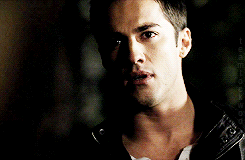
but if he was actually like on the ground, crying being like, I DON’T KNOW WHAT’S RIGHT OR WRONG ANYMORE and Elena kneels next to him and holds him then I could buy that.
Once again, in BTVS, Willow endangers Buffy’s younger sister Dawn because she’s going through a magic addiction and it creates a situation where Dawn actually slaps her and Buffy is walking away from Willow and Willow like falls to the ground, crying, saying she needs help
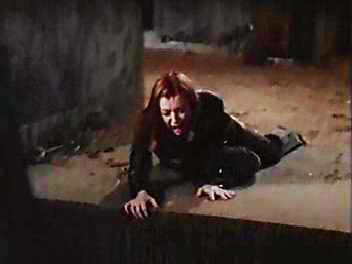
and even though Buffy is FURIOUS she still comforts her

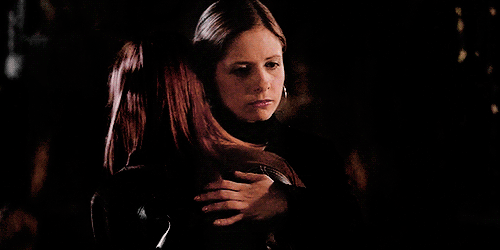
[cont’d] Elena should have that. Elena should struggle with the idea of martyring herself, she should be like Stefan, do you really think I want to die? I’m seventeen, of course I don’t want to die, this entire situation sucks but what sucks more is that everyone else is bending over backwards doing things that will get them killed to make sure I stay alive, I would rather just be dead. You can call me selfish if you want, but none of you are dying if I can help it. Just something like that. Instead we get her having a breakdown over the fact that she was supposed to grow up and have kids and not become a vampire, they should’ve changed that to her breaking down about the choice she made but also not regretting it.
But characterization is not a problem unique to Elena. Damon has PLENTY of contradictions:
Season 1 was all about how Damon would do anything to get Katherine back — it’s not like Elena awakened in Damon the capacity to feel because he’d been feeling and waiting for Katherine for over 100 years. So when Stefan and Damon have that exchange in 2x01 when Stefan goes on and on about how Damon feels something for Elena and he won’t let Katherine come in and destroy that part of him and in season 3, when he’s like “I get it, Elena, I care too much. How ironic.” I’m sitting there like but that part of him was NEVER destroyed! Damon’s problem is that he can’t handle what he feels so he kills people because it’s easier than dealing with his shit. If anything it was Stefan who was unwilling to feel, unwilling to be vulnerable and let someone in and meeting Elena forced him to do that […]
And Damon doesn’t even try to hide the fact that he feels emotions deeply when he kills people because he’s hurt, he’s not stoic and he’s not a brooder, he doesn’t hide how he feels.
And I’ve spoken about the friend dynamics:
With Caroline and Elena I said that I would want actual development there. One of the issues with Elena is that the show just wanted her to be all around likeable, she had no problems with anyone and if anyone had problems with her it was a that person thing not a them and Elena thing. But Caroline and Elena would be more believable as friends and more interesting as friends if they started out as frenemies, if we kept it here

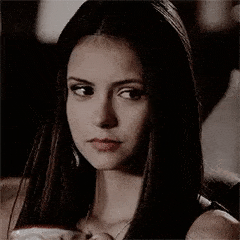
and we found out more about their backstory and how things used to be when Elena’s parents were alive, Elena essentially being the Serena to Caroline’s Blair except not as close as Serena and Blair yet close enough for Elena to care if Caroline got hurt

then Caroline became a vampire and got introduced into that world and through saving her life from Damon and Stefan teaching her and her just being around all the time and Bonnie not fully embracing the vampirism thing, the two of them got closer and became friends more than frenemies
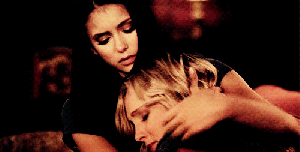
I think that would’ve been better and I would’ve development over they’ve all been BEST friends since they were kids.
For Bonnie and Elena, I need a reason why Bonnie and Elena are bonded for life. I need a reason why Bonnie would go so hard for Elena and I need reciprocity. The issue with TVD is that the writers seem to think that hugging all the time shows closeness because really that’s all Elena does for Bonnie, she hugs her
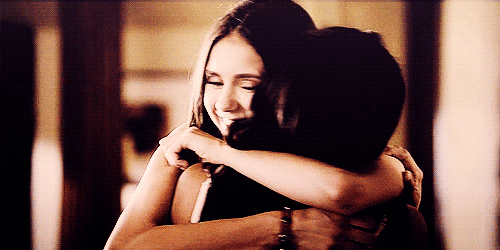


and they have great chemistry as friends but they don’t have a story. What Bonnie and Elena need is an understanding that only they get.
but these aren’t problems that only relate to Elena and her friendships, I have a post about all of the friendships here: http://zalrb.tumblr.com/post/171218100600/do-you-have-any-posts-explaining-why-tvd
But the issue I was having with that anon is that they kept conflating characterization with agency because for the way all of the characters are actually written, Caroline or Jeremy or Jenna or Alaric or Enzo or Matt would not make better “less boring” protagonists because they are not active. Is there potential in having them as protagonists, yes, but there was potential in having Elena as a protagonist too. As I said, Bonnie is the one who actually goes through an active journey and has to save people and has to sacrifice and has to learn spells and battle ancient vampires so aligning with her would be radically different than aligning with Elena but not so much anyone else and as you said, we see that in seasons 6-8. Caroline’s storyline in season 6 doesn’t go anywhere. Her mother died but Stefan and her relationship to him is really what we focus on, like seriously, they make her confront him about their relationship at her mother’s funeral and then have her turn off her humanity because he wouldn’t tell her he likes her. How is that any better than season one? In season 7, she’s impregnated without her consent and knowledge and instead of focusing on how that would affect her, we focus on Ric’s feelings. She doesn’t drive plot, she reacts to story. Bonnie was stuck in a Prison World with two serial killers then she was stuck in it alone and became suicidal and then had to claw her way out of the world, that’s an active plot and she drove it.
15 notes
·
View notes
Text
I wasn’t entirely sure if I wanted to do entire posts about each episode of :re season 2, but episode 14 was really good and I have a lot of things to say about it, so here we are, lol.
It still might crash and burn later, but for now I’m still enjoying it, even though I’m clearly in the minority.
Anyway, the rest will be under a cut since it’ll be long and also spoil the entire series.
In a lot of ways, I ended up being pleasantly surprised by this episode, even though a lot of it technically went the way I expected. Like how they decided to end on the note of Arima slitting his throat. But a lot of the stuff in-between was interesting.
I was kinda surprised that they actually included Yomo’s entire backstory flashback about how Hikari and Arata got killed. I kinda figured they might cut it out, or at least heavily condense it, but they kept it pretty intact. I’m glad they did, though, since it gave this arc some much-needed thematic content.
On a more minor note, I appreciate that the anime doesn’t bother with some of the little things the manga did in order to set up chapter by chapter cliffhangers. In the Yomo-Arima fight in the manga, there was a whole cliffhanger where it looked like Yomo got killed, but that doesn’t really work at all in an anime when you don’t have to wait a week to see how the scene progresses, so thankfully they don’t even bother with stuff like that. On the one hand, it probably contributes to the overall feeling of the fights being less ‘intense’ than they were in the manga, but on the other hand, I very quickly got burned out by the constant, unnecessary cliffhangers in the manga. So this is much more pleasant in my opinion.
The other big change, from what I remember [beyond the fact that this episode just focused on continuing the Cochlea arc instead of swapping between it and the Rushima arc like the manga did], is the stuff with Hide. I feel like I’m gonna need to sit on it for a while to sort out all of my feelings about it, and in general I’m very curious to see how they handle his character later on once he actually returns to the main story, but my immediate reaction is that I think I actually prefer this to how the manga handled it.
As much as I love Hide as a character and basically everything surrounding his relationship with Kaneki, I never actually liked how Ishida handled the whole plot point of how Kaneki ate part of Hide’s face at the end of the first series. At the very least, it was executed very haphazardly, and a lot of it felt kinda clumsy and unplanned, with the flashbacks that Kaneki had to it at this point in the manga being some of the more glaring examples of it. It still to this day bugs me that, in the manga, we never got any clear answers for why Hide knew to find Kaneki there, why he knew to lead him to Arima, why he was willing to let Kaneki eat him, etc etc, and I feel like even once he came back into the story, there was no real impact to it, and the story spent absolutely zero time exploring the concept of how Kaneki’s feelings of guilt would change after knowing that Hide’s actually alive. And the specific way that the initial flashback to the sewers was handled always felt like a blatant retcon in general, and it just didn’t really cleanly fit with how the scene was initially portrayed in the first series.
So honestly I can totally live with the anime heavily changing how it handles this entire plot point. It’s always been a bit of a thorn in my side, so I’m glad they pretty much cut out the stuff that annoyed me the most, and kept the really nice stuff.
And also, I think that the whole detail of Kaneki being suicidal in this arc still makes total sense even without the whole lingering thread of him thinking that he murdered Hide. It’s pretty consistent with Kaneki’s personality in general to be suicidal and want to throw his life away to protect others, so I think it still works totally fine. And it also avoids the kinda awkward dissonance the manga had where the idea of Hide’s self-sacrifice got unironically glorified by the narrative and never criticized or explored at all, but it was used to say that Kaneki’s self-sacrificial attitude was bad and stupid, which still feels kinda hypocritical to me.
I wish the hallucination scene could have been a little longer, but it was still really nice and effective to see Kaneki finally open up about how severely he misses Hide. I still think that it’s a very effective scene even if you remove the context of him thinking that he killed Hide in the first series. Also, the :re character designer’s take on Hide is cute as hell and I can’t wait to see more of him later on.
We’ll see how it goes, but I’m really hoping they change things a bit later on so that he shows back up again a fair bit earlier than he did in the manga, since it felt like by the time he became relevant again, he was immediately overshadowed by everything else going on, and there was no time to do anything with him. So I hope they bring him back into the main cast a fair bit earlier, so they have more time to work with.
I’d actually kinda forgotten about it at first, but I guess they also skipped over Kaneki’s flashbacks to being kept prisoner in Cochlea, and how he lost his memories. To begin with, it’s entirely possible that they’ll just bring it up later, like during Arima’s whole dying monologue or something, but honestly I don’t think it’s a huge deal. It doesn’t tell the audience anything that couldn’t be easily pieced together. It also put an even more overtly off-putting slant on Kaneki and Arima’s relationship. It reminds me a little bit about how the manga outright spells out that Akira is intentionally acting as a mother figure to Kaneki because she was told to do so by her bosses to manipulate him more effectively, but I prefer how the anime cut it out and just let the audience think on their own terms about Kaneki and Akira’s relationship.
Other than that, I don’t think there’s too much to say about this episode itself. Although I did quite like the choice of translating that one line from Furuta as ‘teeth-hee!’. That was pretty good.
I know this post is mostly just about episode 14, but I’ve been thinking a lot over the last week about the writing choices made in episode 13, in terms of how it dives straight into the Cochlea/Rushima arc, and the more I think about it, the more I think I really like it. It’s not completely perfect, but still.
I think people forget that the overall start of the whole Cochlea/Rushima arc in the manga was where the pacing of :re in general started getting notably unbalanced and wonky, and a lot of things just kinda happen or get introduced with very little set-up. For example, the manga doesn’t exactly give much more of an explanation for how the CCG found out about the Aogiri base on Rushima. We just kinda find out soon after the time-skip that they’ve already started their raid on the island. And even the introduction to the second generation Qs was basically just ‘here they are, here’s their names and a few personality-establishing lines, OK now we’re going to do other stuff now and forget about them’. It basically ended up being a running joke that the Qs got more and more unimportant as more of them were introduced.
I’m at least assuming that some of the details like the way that Urie and Mutsuki in particular feel betrayed by Kaneki abandoning them will get touched upon once we properly go back to the Rushima arc, but that’s really most of the relevant stuff that episode 13 skipped over. It was also a bit sad to see them cut the dinner party scene with Urie and Matsuri, but honestly I’d prefer the anime not do anything with Matsuri at all as a character, if the alternative is them handling him as badly as the manga did in the long run.
Also, another important detail is that the manga also intentionally took us out of Kaneki’s head for a while after the time-skip. There was a good like eight or nine chapters or so where he was basically just being moody and we had no idea what was going on with him. So it’s not exactly a surprise that episode 13 also involved us not getting a look into his head.
I also really like that the anime is way more focused in how it’s just showing one arc at a time, whereas the manga was a lot more liberal with how it kept jumping between Cochlea and Rushima. And as someone who was reading the series as it came out by that point, trust me when I say that it was pretty agonizing. This is WAY smoother. To put it into perspective, Kaneki’s hair turns white at the end of :re chapter 75, but after that it doesn’t really return to his fight with Arima until around chapter 82, which ends with Arima slitting his throat. So the pacing here really does feel WAY more satisfying.
It’s also part of why the anime probably feels faster to people than it actually is, since it’s front-loading the Cochlea arc much more heavily than the manga did, and pushing back the Rushima arc to later.
And on that note, it looks like we’re actually going to have a Rushima arc episode next week, which is a little bit surprising, since I thought they would go through the entire Cochlea arc at this rate before going to the Rushima arc. But this is fine. We left off on a pretty satisfying cliffhanger with this episode, so I’m down with the anime shifting to an entirely Rushima arc-focused episode now.
I’m curious to see exactly how much of the arc they cover in the next episode. Considering that about half of volume 8 and all of volume 9 of the manga was focused on it, I think it’d take some substantial cuts for them to cover it all in one episode. The preview/synopsis for it seems to focus mostly on the Suzuya-Kurona fight, and the Tatara-Houji fight, but it also looks like it’ll also include some of the stuff with Takizawa, and at least some of the Mutsuki-Torso stuff. But even aside from that, there’s still stuff like the flashbacks to the time Amon and Takizawa spent with Aogiri, the raid on Kanou’s lab, and the whole scene where Marude assassinates Yoshitoki, so I don’t exactly think they’re going to get through all of that in one episode.
So after the next episode, I suppose it’s just a question of if they can wrap up the remaining threads of both arcs in one episode, or if they’ll need two. I guess we’ll see.
In the long term, I still have no idea exactly how the anime will be paced after this whole arc ends, but either way it looks like we’d effectively be left with seven or eight episodes to adapt the last seven volumes of the manga, so I’d expect there to be some substantial cuts and changes to make it work. Hopefully it’ll work well.
5 notes
·
View notes
Text
BlacKkKlansman: Double Consciousness & Extremist Identities
I saw BlacKkKlansman last night, and I’m still trying to properly breathe around the cold stone it left in my chest. I’ve been thinking about it constantly, and whenever that happens I always feel the need to write some sort of analysis to try to articulate why I’ve reacted so strongly to something. So, here’s my half-baked BlacKkKlansman review.
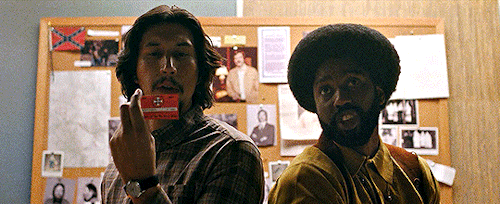
First things first, I’m white. Of course, that affects the way I view the world and whatever art/media I choose to consume. I fully recognize that my experience and takeaway from this film are likely very different from those of a viewer of color. And sure, I can say that I try to be progressive in how I live my life and I took college courses on race politics and minority marginalization, but at the end of the day, this is a film about black voices and black equality and those are topics I have no right to discourse on. So please, if something I write below seems misguided or uneducated, please let me know so I can self-examine and adjust.
First of all: The simple fact that this movie had such an effect on me as a white viewer. I was in a crowded movie theatre, with an audience of diverse age and race, and never in my life have I felt such a powerful moment of silent, unified shock when the credits started. The ending left every single person speechless. White privilege means that when I read news articles or books about institutionalized racism in our country, I have the option of closing the book, walking away and thinking about something else for a while. Not the case whatsoever with this movie - It didn’t discriminate in its devastating impact. While I’ve read about Black Power ideologies, there’s always an aspect of such movements that are designed not to be fully understood by those outside of it. These are not for me. This seems as intentional as it is justified. Black communities are excluded from so many mainstream ‘white’ narratives or locuses of power, these movements are the sole spaces that belong entirely to them and which they entirely control. They are designed to alienate, the same way these communities are alienated from so much else in society. However, BlacKkKlansman seemed accessible to a multitude of viewpoints and cultural/racial positions. The film does not strive to tell the audience how they should feel, but leaves elements of interpretation up to the viewer by presenting a chorus of voices, rather than a single one; By presenting multifaceted characters experiencing conflicts of identity - Rather than a single protagonist with a single political message. This is certainly not to say that a film is only good if it panders to the understanding of white viewers, but in this case I was impressed by the multiplicity of narratives and perspectives that were portrayed.
What’s so thought-provoking to me about the film was the decision to tell the story from the position of the undecided and conflicted center. By following Ron and Flip’s investigation, we watch each character grapple with the opposite sides of extremism. While Flip has to ingratiate himself with the Klan members who would revile his Jewish heritage, Ron has to spy on his own community at Black Student Union events as they call for war against the police. Both characters must play roles in order to pretend to fit into the groups they look like they should belong to. In Flip’s case, feeling threatened and despised by the Klan’s ideals makes him re-evaluate the meaning of the Jewish identity he never thought much about. For Ron, he feels torn between his loyalty to his people, and to his own hard-sought and prized work as a policeman (an institution equally reviled by Patrice and Klan members). Ron and Flip both wear masks, and their feelings of separation from “their” respective communities makes them each consider the conflicting identities within themselves.
Aptly, Patrice speaks to Ron in one scene about double consciousness. She questions whether it is possible to be both a black woman and American citizen. To her, putting her country first would be a betrayal to her black identity. In juxtaposition, the Klan members dress up their intolerance behind the values of “America first” (I can barely describe the chills that went through me when the Klan members all started chanting it.) Ron’s struggle throughout the film is exactly this - His determination to be both a black man and a police officer. He and Patrice disagree on whether it’s possible to change a corrupt system from within, and the movie leaves ambiguous how much Ron succeeds in this front. It’s crushingly infuriating when, towards the end of the film, Ron is himself detained and beaten by policemen who don’t believe he’s an undercover cop. But shortly thereafter, he enjoys a triumphant entry into the police station where all his white colleagues congratulate his work and embrace him. The scene when he calls David Duke to reveal his identity with his three colleagues giggling on either side of him is downright charming in its camaraderie and gaiety. It looks like acceptance; But tempered by the fact that all his hard work on the investigation was ultimately scrapped in the end.
These themes of double consciousness and ambiguity permeate the film, and lend to its impactful success. Split-screen parallels are presented between Klan and Black Power movement meetings - Certainly not to equate the two, but to show in stark, unmistakable terms that these are the polar opposite, yet intimately interrelated effects of racism. This is how distantly racism divides our country - And how it leads to beliefs on either side that people will kill for. Towards the climax, a Black Student Union meeting listens to the horrific history of a young black man being brutally lynched, while the Klan members cheer and applaud a scene in Birth Of A Nation depicting the hanging of a black man. Neither side exists without the other to perceive it as a threat - And both stand firm in their respective beliefs that their hatred of the other side is justified.
Yet, the film wasn’t the story of the Klan, nor of the Black liberation movement - It was the story of the two men caught in the middle, looking for footing on quickly-shrinking ground between the two sides, as their mutual hatred brings the two warring sides to an inevitable conflict. It is the same story of many modern viewers, wondering how in hell we’ve come to the present moment with “Black Lives Matter” on one side and Trump proclaiming “America First” on the other - with not an inch of common ground or even common perception between the two.
Although I hope most viewers would intuit which side is truly more justified in their grievances, a strength of the film was its balanced, rather than caricatured depiction of the Klan members; Who believe that yes, they live in a racist country - “An anti-white racist country.” The chilling brilliance in the depiction of David Duke was how harmlessly normal he first seems - Cheerfully spouting off phrases like “you’re darn tootin’“ on the phone to Ron and ending the conversation with a chipper “God bless white America!” This is exactly how ideologies of hate become disguised as civilized, mild-mannered “values.” David Duke has given up the flashy title of “Grand Dragon” for the more innocuous “National Director” (or something to that end). The first time he goes undercover, Flip is quickly admonished never to call the Klan “The Klan,” but rather “The Organization.” In a conversation between Ron and one of his superiors at the police station, it’s even discussed how a high-ranking Klansman might have the long-term goal of placing “one of their own” in the White House, after they’ve disguised their intolerance and bigotry under the empirical rationales of policy. It’s one of the most painful moments of the entire film.
Yet, while Flip has to endure the Klan members’ talk of killing black people, and Ron hears Kwame Ture speak about race wars with inevitability, another stroke of the film’s thoughtful genius is the choice of individual who actually enacts violence - Felix’s utterly apple pie looking housewife. She looks like the plump, harmless woman you wouldn’t want to be in line behind at the grocery store because she’s likely to have fifteen coupons. She is the last person you would expect on sight to leave a bomb at the house of a young black woman. And yet, this is another powerful message: How the vulnerable and susceptible can so easily become radicalized. I certainly don’t have sympathy for her because she’s an adult who made her own decisions; But I’m also aware of the way her Klansman husband manipulated her into becoming what she was, and it’s an extra layer of nuance I appreciated.
Finally, I’ll wrap this up on a personal, perhaps silly, note. There were multiple layers of this film that really disturbed me, and it’s taken me a good 24 hours to put my finger on this last one: I’m not sure I enjoyed Adam Driver as Flip. Don’t get me wrong here, I’m all over that shoulder gun holster look and he looked 500% finer in flannel than any man has a right to. Also, I’m not sure I would feel this same discomfort if he’d been played by a lesser-caliber actor, or one who I don’t have such an attachment to. But I realized that on an instinctive level, it upset me to see his face under a Klan hood, and to hear him say vile racist comments. Rationally, of course I know that A) He’s acting, and B) Even his character is acting, but Adam’s an utterly convincing actor, playing an undercover detective who’s very good at his job. Maybe both his and Flip’s performances were too good. I asked myself why it didn’t bother me the same way to hear Ron spout racist bullshit on the phone. Part of it is because he isn’t played by an actor I happen to deeply respect and admire, but there’s more to it than that. There’s a passage in the NYT review that got as close to my nebulous discomfort as anything I could express:
"The most shocking thing about Flip's (Adam Driver's undercover detective role) imposture is how easy it seems, how natural he looks and sounds. This unnerving authenticity is partly testament to Mr. Driver's ability to tuck one performance inside another, but it also testifies to a stark and discomforting truth. Maybe not everyone who is white is a racist, but racism is what makes us white.”
Adam’s performance as Flip is discomfiting because it shows how easily a white person can take up the mask of extreme bigotry and intolerance, and how easily they can be perceived as supporting a hate movement, regardless of their true internal ideologies. I know Flip doesn’t mean the things he’s saying, but he’s damn convincing because he looks the part. His whiteness paired with his words - regardless of whether they’re genuine - is powerful and terrible. And racism is what lends him the ability to put on that convincing mask. And if racism is what “makes us white,” Adam as Flip makes me wonder if I could do the same. If, for whatever reason, the situation was such that I had to convince someone I believed in these things... Would I surprise myself by finding that I’m capable of saying things equally terrible? Is this a role that every white person is capable of, at a certain subconscious level, because of systemic racism and implicit biases?
In conclusion: This movie has fucked up my life. It’s genius and I think I need to see it again. (If I can stomach it...)
14 notes
·
View notes
Note
Hi Sophie! Based on your experiences, how hard do you think it is to get a perfect 50/50 both internally and externally for a short story in Extension 2? What kinds of stories and approaches to writing do you think/know get full marks? Additionally, if you were a marker, what features of your piece and others' pieces do you think made/would make them worthy of a 50? Thanks for all your wisdom!
Thanks for such interesting questions! My answers grew rather long, so I’ve thrown them under the cut.
50/50 internal and external
The 50/50 external mark is certainly harder than a 50/50 internal. It may as well be in the hands of the gods for all the influence you have. Unlike your teachers, the markers haven’t seen the blood, sweat and tears you poured into your major. They don’t even know your name. Conversely, you don’t know who they are either, or what their preferences are. Your major arrives at the marking centre as a product that has to stand on its own merits against the entire state EE2 cohort - about which you know nothing - not the forms they’ve chosen, not their concepts, absolutely zip. You’re blind to the competition. This is of course without even mentioning the small but no less insignificant 10% weighting of the Reflection Statement, which needs to be outstanding too. (Scaling also plays a part, but I’m not sufficiently well-versed in that to offer anything beyond this advice: if you want that perfect external, make sure you’re ranked first internally.)
The perfect internal mark is comparatively easier (which I suppose doesn’t say much considering how high I set the bar for the perfect external lol). But keep in mind that a 50/50 internal doesn’t make a 50/50 external any more likely. Some of my peers who did very well internally, with high E4s, were disappointed with their low E4s and sometimes high E3 external marks. Hard as it may be to swallow, it can end up being sheer luck that gets you over the line.
Doing well in the internal assessments comes down to a number of factors, including but not limited to your teachers’ marking preferences, your school cohort, and the effort you put in.
I was quite fortunate that one of the teachers who marked my draft in progress (the third assessment) historically liked my writing style. If possible, get to know the things your English teachers prioritise in their marking beyond what’s listed on the rubrics, and it may (or may not) make a difference in your final mark. As for your EE2 cohort, the better the competition, the harder you have to work. The quality of my cohort was extremely high, and the margins between students were tiny. To give you an idea: I got 9.5/10 on my Viva, full marks on the next two assessments, and squeaked into first in EE2 by 1 to 1.5 marks. It was a struggle the entire way to do my best for the second and third assessments, and I had to get the time management just right. Because yes, a lot boils down to the effort you’re willing to invest into a perfect mark. There’s no need to make a hard process even harder for yourself by not keeping on top of your writing and research.
Stories and approaches that score well
People have all sorts of (sometimes cynical) opinions and hot takes on what stories appeal to markers, e.g. feminist, postmodern, counter-cultural, what have you. I don’t want to speculate on subjects that do or don’t do well, since that’s way out of my league. What I will say is that if you’re sincere and earnest in your approach, whatever the subject, you should be rewarded for it. (Not that you will, but writing in good faith speaks far better for you than cynically selecting a type of story in the belief it’ll maximise your marks.)
For actual evidence of things that markers like, you can’t go wrong with the HSC marking feedback (formerly known as the notes from the marking centre). Two examples from the 2017 cohort:
“Students should avoid the overuse of adjectives and clunky visual descriptions”
Better responses “had a strong and authentic character voice that built and developed throughout the narrative”.
As for approaches:
Originality
Around my time, I think convention had it that outrageously experimental postmodern stories were in vogue and tended to do well with external markers. That belief came in part from the short stories that made it into Showcase, which is a good time to reiterate that Showcase majors aren’t selected on quality alone; they’re a cross-sectional representation of what can be done in EE2. If anything, the postmodernity was not an end in itself but a good way of encapsulating the innovation, originality and “thinking outside the box” that markers like. It probably goes without saying, but clichés in the mould of teenage romances don’t play well. Markers are looking for fresh, interesting perspectives that ideally challenge, interrogate or otherwise question received wisdom. (Caveat: there’s nothing wrong with telling an old story well, though it would have to be technically mind-blowing to get you full marks.)
Complexity
Your concept (and writing) should be complex, nuanced; something you could spend days unpacking. I’ve explained this before as developing a concept that’s deep enough to explore in detail, but not so broad as to be unmanageable. To use my major as an example - the umbrella concept was translation, but under it I explored a) the idea of translating reality into fiction, b) the translator/author relationship, and c) the value of translation in contemporary literature.
As for nuance: black/white approaches to your subject matter aren’t going to get you full marks. To say “war is bad” through your major is fine, but if you’re going to hit your audience over the head with ham-fisted, heavy-handed metaphors and one-dimensional characters who suffer for suffering’s sake to make the point, then you’re not exactly endearing yourself to the markers. Didacticism in fiction can and will come off as condescending, and that’s the last thing you want. Nobody likes being talked down to, or having their intelligence insulted. It’s entirely possible to tell a nuanced story about the various horrors of war, from the immediate impact on civilians to the inter-generational trauma, without throwing characters into a stereotypical war zone and expecting the setting to speak for itself. You want depth and detail, because war is terrible in so many different ways. Don’t use your story as a megaphone to yell the same line over and over at people. Yell a series of images, characters and events that will move them to tears. (Anyway, this is treading onto the grounds of fiction-as-activism, which is another thing altogether.)
Ambitious
As the saying probably doesn’t go, if you aim for the moon you’ll hit a tree, but if you aim just for the tree you’ll never get off the ground. A short story that gets full marks will have vision and ambition. It doesn’t end where the story ends, but opens up a new world of possibility or way of thinking that the reader might never have considered before they read your story. The short of it is: say something!
It’s tempting to believe that ambitious short stories = stories that tackle “heavy” subjects like war, climate change, poverty, inequality, or any one of the social ills afflicting our world today. For what it’s worth, I don’t think there’s anything wrong with writing on those things. Choosing to do so would demonstrate your maturity and willingness to confront difficult issues. But it’s not a golden ticket. Writing about systemic racism alone is not going to get you full marks. It is entirely possible to pick something profound and butcher the execution. When choosing a concept, I would always prioritise things you feel most passionate about rather than their perceived legitimacy on some arbitrary scale of importance.
I wrote about translation, and literary translation at that. It’s not a hot button topic. But it was something very close to my heart; I knew that translation was not just about languages but also reality into fiction, and it was something I wanted to tell the world (or failing that, just the EE2 markers). So I did. A good short story can really be as simple as having something to say.
If I were a marker
Authentic voice
If I were a marker, this would be the most important thing for me. I know voice can be a slippery concept for some, but what I mean here is the distinctness of a student’s style. It goes beyond the words they choose and the order they put them in; it’s the way the student expresses their ideas in their own words, and speaks through their major works. This is why I’m big on students choosing concepts they feel passionately or strongly about, because if you’re writing on something you love with all your heart, the more likely it is that feeling will come through in your particular voice. If you wanted another way to put it, it’s your “brand”, the set of qualities that makes your writing yours. Have you ever read an author enough times to recognise their way of writing? Like, you see a snippet of writing and think, “hm, that sounds a lot like Neil Gaiman.” That’s what you want with your major. Your subject matter might not resonate at all with me, but if through the boldness, clarity and passion of your written voice you can convince me how much you care about it, then I’d be putting you in a higher band.
Originality
To add to what I wrote above on originality, there are several ways to demonstrate original thinking: putting a new spin on or subverting old tropes, choosing to explore a more obscure field, telling historically marginalised and/or overlooked narratives (e.g. I once read part of a major that focused on Dorothy Wordsworth, William Wordsworth’s sister), even stories that resonate with the current social, political and cultural climate.
I think originality was what helped my major stand out. For one, I wrote about literary translation and translators, which wasn’t something that enjoyed much exposure in fiction. Second, most people think poetry when they think translation (the old adage of “lost in translation” most often gets applied to the vagaries of metaphors you commonly find in poetry), so for me to choose the short story form was an interesting subversion. Though tbh, I think people worry disproportionately about how original their stories are at the expense of telling a good story. There’s no need to push yourself into the realm of edginess for the sake of originality. At the end of the day, what you want is essentially a thumping good story. Sometimes it’s easier, and infinitely more fun to rework what you already have in front of you. I like to think of this approach in an Oulipian way - setting yourself restrictions within which you have to work. Surprising, I know, but boundaries can force you to be flexible.
Authorial control
Something that I know markers look out for is authorial control - on the simplest level, they want to see that you’re able to keep your tenses and characterisation consistent; on a higher level, it’s about sustaining your metaphors and ensuring textual integrity. Put another way, your story needs to be coherent and consistent. A character you’ve associated with a crow isn’t suddenly associated with an eagle for no reason.
Another way I’ve heard authorial control described is keeping your story tight, contained. You’re not wasting words, the story progresses logically and smoothly; there’s a sense you know where you’re going and how you’re going to get there. If you spend the first ten pages describing the weather and the main character’s appearance without any discernible introduction of a larger theme or concept, that’s a failure of authorial control. (Hot tip: your first draft doesn’t have to be controlled at all, and it’s better to allow yourself to be a hot mess than to get hung up over producing a perfectly poised short story from the get go.)
Evidence of research
EE2 is about research and independent investigation, so naturally I’d want to see evidence of that in a short story that scores full marks. It’s one of those things that’s painfully obvious by its absence, but absolutely scintillating for its presence. For the former: if for example you’ve set your story in modern day Japan and have as your protagonist a typical Tokyo schoolgirl, but provide few, no or incorrect supporting details (e.g. landmarks, street names, the flow of a school day, cultural practices, etc.), then your story wouldn’t hold together and I wouldn’t be inclined to score you well.
Evidence of research usually entails great, sometimes painstaking attention to detail, and a comprehension of the subject matter that’s been fluently integrated into the story. To use my major as an example again, I did a lot of research into how translators related to their translations and to the original author, and incorporated my findings into my main character and how she felt about her translation.
Other posts you may find helpful:
An ask a while back about what I thought made my MW appealing.
Another ask along the same lines as the one above.
What I think the difference is between a 48 and 50.
5 notes
·
View notes